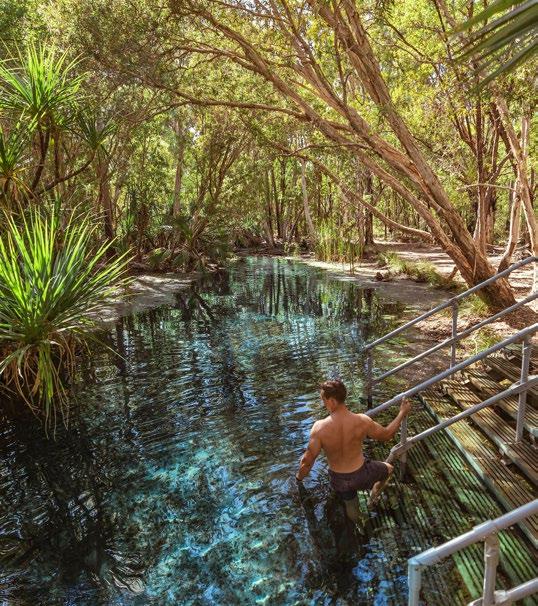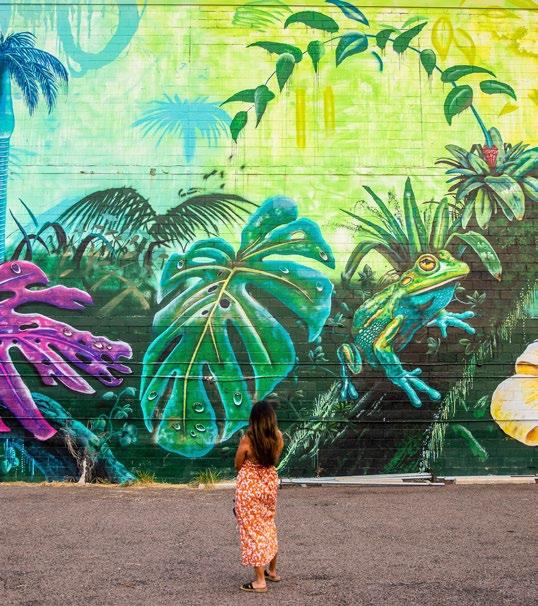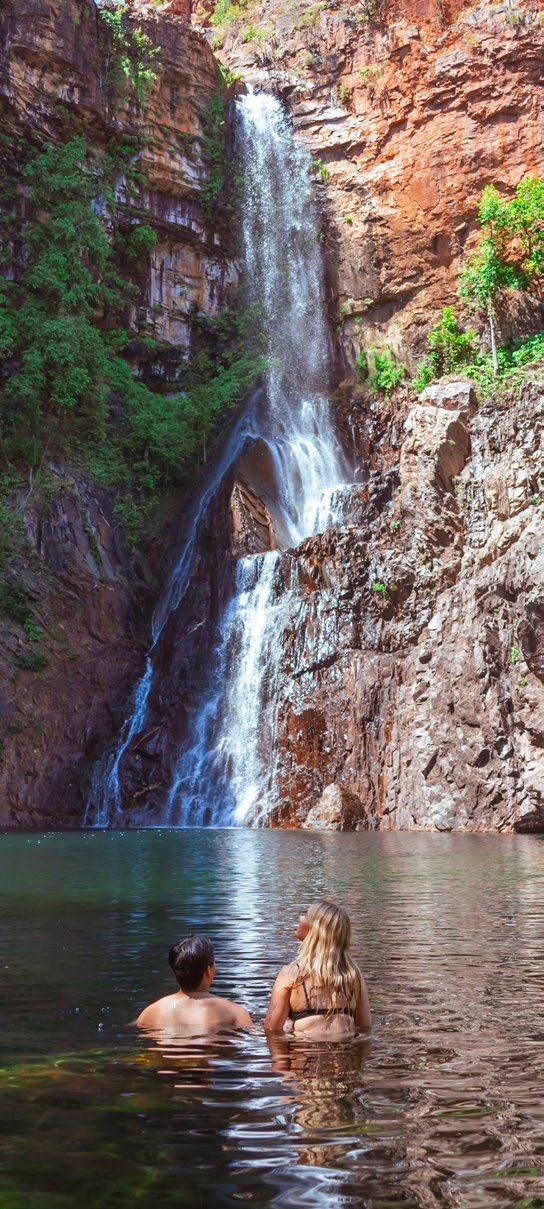DARWIN
REGION
ATTRACTIONS - MAPS - EVENTS - SERVICES











Situated on the edge of a picturesque harbour, Darwin is a fascinating melting pot of people and cultures. It prides itself on its unique and friendly laid-back lifestyle.
While a sophisticated, modern city in its own right, Darwin is also steeped in a history that has endured many hardships on its way to establishing itself as the gateway to Asia.
Darwin is the home of Northern Territory commerce and business and, with its world-class natural and cultural attractions, it is also a thriving hub of activity in terms of tourism, nightlife and retail.
Some great annual Territory events that are not to be missed include the exhilarating V8 Supercar Challenge, The Bass in the Grass concert - Darwin’s own version of the Big Day Out, the Darwin Cup Carnival - six weeks of horse racing, and the Darwin Festival, just to name a few.
The ‘must see’ attractions in Darwin include the open-air weekend markets at Parap, Nightcliff and Rapid Creek. During the Dry, the famous Mindil Beach Sunset Markets operate on Thursday and Sunday evenings, and the Palmerston Markets operate on Friday nights. These markets are rich in delicious foods as well as local artisan products and entertainment.
Make sure you set sail on the magnificent Darwin Harbour aboard one of the many sunset harbour cruises that operate out of Cullen Bay Marina and Stokes Hill Wharf.
The harbour is also great for fishing as are many of the beautiful inland billabongs, big tidal rivers and mangrove-lined estuaries. If you don’t have your own boat and fishing gear then jump on board one of the fishing charters that know all the good spots and specialise in all types of fishing including barramundi, reef and deep sea. Your guide will even fillet your fish so you can take it with you and cook it straight on a barbecue.
To appreciate and enjoy the seasonal changes in the Top End, remember that the Wet is from November through to April and the Dry is from May to October.
And while the Dry is the most popular for holidaying in the Top End, the Wet delivers the Northern Territory its most beautiful scenery – waterfalls, rivers and creeks – which meld into giant floodplains and lush tropical growth. Not to mention that the Wet gives you the perfect excuse to retire on the balcony with an ice-cold beer or a chilled wine and watch the storms roll in over the ocean.

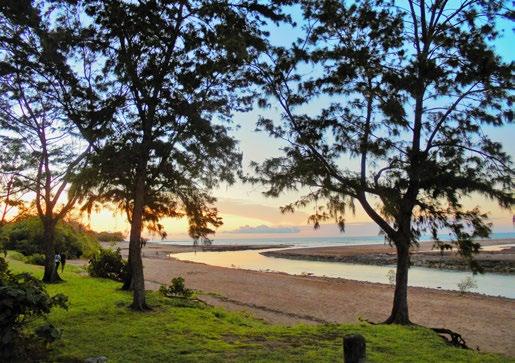
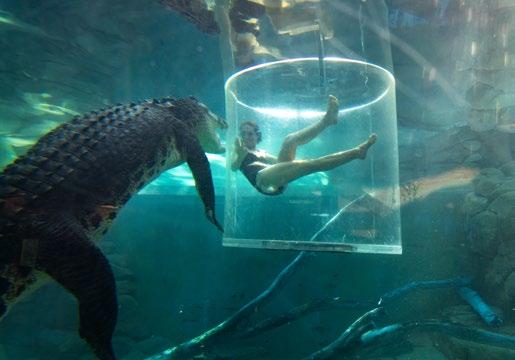
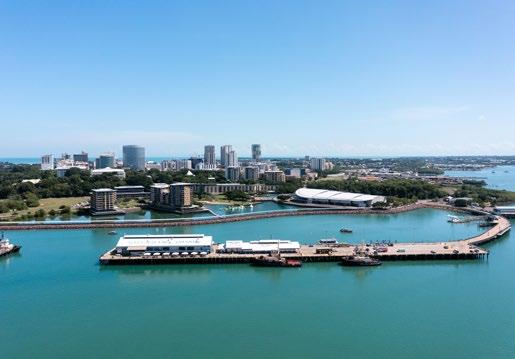
Just 50 minutes from Darwin, NT Adventure Park offers up more adventure than you can muster. Enjoy a range of activities including Outback Quad Adventures, Outback Buggy Adventures, Camping and Dining Under the Stars and more. For more information, call 0468 615 608 or visit www.facebook.com/NTAdventurePark
Aquascene is a fish feeding sanctuary located at 28 Doctors Gully Road in Darwin. Each day, the high tide attracts schools of friendly wild fish close to the foreshore. Visitors can feed the fish (bream, barramundi, milkfish, batfish and catfish) with fresh bread. Opening hours on high tide. Café serving great coffee and bagels onsite.
Darwin Aviation museum
The Darwin Aviation Museum, previously known as the Australian Aviation Heritage Centre, features an impressive collection of the Territory’s aviation history. There’s a massive B52 Bomber; F111, Mirage and Sabre jets; a Spitfire replica; and Wessex and Huey Cobra helicopters. Open daily from 9am - 5pm, entry costs $20 for adults, $15 for seniors, $10 for children (free under 12), $15 for students and $50 for family pass.
Burnett House
Built in the late 1930s, Burnett House is a heritage-listed National Trust property and an excellent example of early tropical architecture. Open 10am - 1pm Monday to Saturday, and Devonshire Teas are served on Sundays 3pm – 5pm throughout the dry season (May - September).
Casuarina Coastal Reserve
Located in the city’s northern suburbs, this coastal reserve is a great place for a walk along the beach to catch a sunset from the Dripstone Cliffs or enjoy a picnic in the shady recreational areas. For the naturists among our visitors, a section of the beach has been set aside for use.
Charles Darwin National Park
Just a short drive from the city, this park was developed to show visitors the rich mangrove habitats of Darwin Harbour. Relics of Darwin’s involvement in WWII can be seen here. These reinforced concrete bunkers were used for safe storage of munitions during the wartime action. Open 8am - 7pm and camping is prohibited.
Crocosaurus Cove is a unique attraction that enables visitors to acquaint themselves with Australia’s very own saltwater crocodile. Showcasing the largest array of Australian reptiles in the world, Crocosarus Cove is fun for the whole family. Open daily 9am - 6pm.
Cullen Bay Marina features an eclectic mix of restaurants, cafés and gift shops. The marina is also home to beautiful privately-owned boats, as well as many of the sunset harbour cruises and fishing tour operators. Vessels must pass through a double-action loch to access the sea, established to protect the marina.
This precinct has many historical and modern attractions. Here you can catch a cruise to explore the harbour, relax and enjoy the seasonal live entertainment or drop a line from the fishing platforms. Visitors can also do a spot of shopping, pamper themselves with day spa treatments or gather some information on Darwin day tours.
At the Darwin Waterfront there is so much to do for everyone. Here you will find the wave lagoon, the beach, parklands and public art, restaurants and cafes, Aqua Park, playground, sports facilities, shopping, the Convention Centre, harbour cruises and other attractions. For more information, visit www.waterfront.nt.gov.au
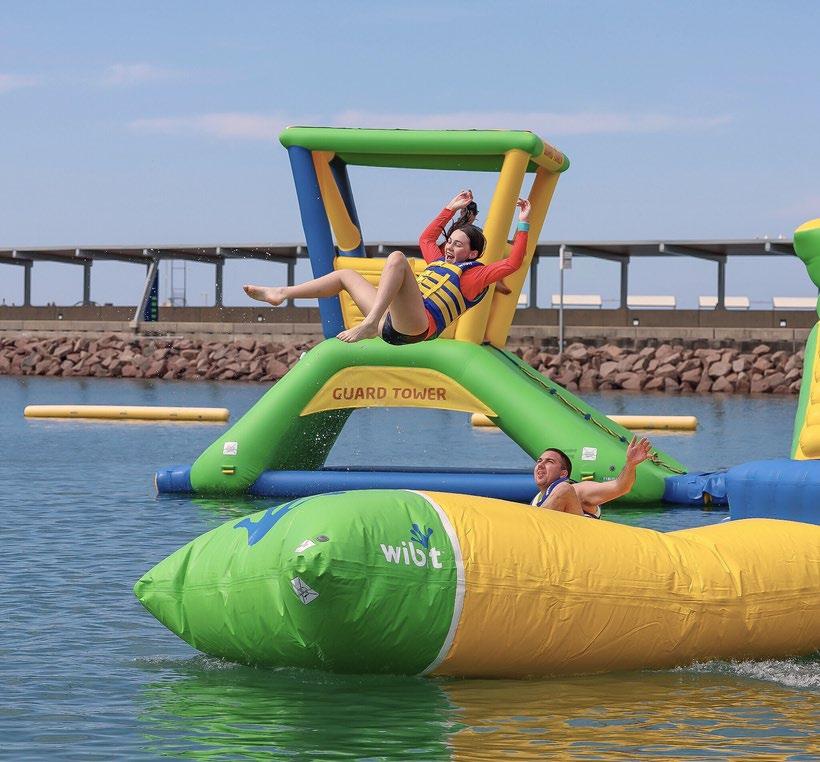

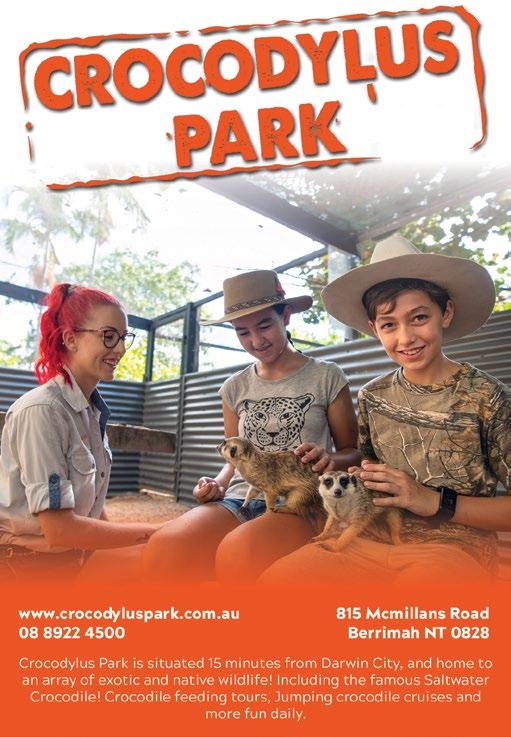
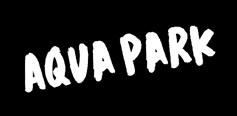

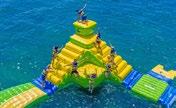






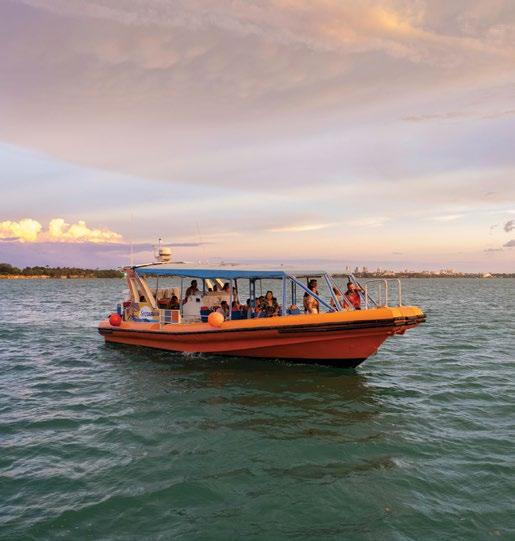
Deckchair Cinema
Located at the Waterfront Precinct, this is Darwin’s iconic open-air cinema open 5.45pm nightly. Dinner is available every night for patrons to enjoy on a balmy dining deck overlooking Darwin Harbour and fringed by tropical garden. Arrive early to enjoy a refreshing sunset beverage from the fully licensed kiosk, then kick back to enjoy the movie under the starry sky. Deckchair Cinema is closed during the Wet. Films cater to a variety of tastes.
East Point Reserve & Lake Alexander
This recreational area has extensive walking and cycling paths, relaxing picnic areas with free barbecue facilities and safe, year-round swimming in Lake Alexander. The reserve is also home to Darwin’s East Point Military Museum and Defence of Darwin Experience. Open daily, admission to the reserve is free.
Fannie Bay Gaol
Opened in 1883, the Fannie Bay Gaol was the major detention centre in Darwin for almost 100 years and is now open to the public as a historic site. Located along East Point Road in Fannie Bay, the precinct still conveys the oppressive atmosphere for which it was originally intended. Open Wednesday to Sunday 10am – 2pm. Free entry.
George Brown Botanic Gardens
These gardens span 42ha and showcase the flora of northern Australia and other tropical habitats around the world. The Wesleyan Church, located within the gardens, houses Eva’s Cafe.
The museum, located at 19 Conacher Street, Bullocky Point, features collections of the region’s art, natural science, history and culture. Encompassing cultural artefacts, maritime archaeology and Northern Territory history, the museum also houses a great Cyclone Tracy exhibit and the chance to meet Sweetheart, the Top End’s most famous crocodile. Open daily 10am - 4pm and admission to the museum is free.
Free guided tours of NT Parliament House are available. Parliament House is also the location of the Northern Territory Library housing the most comprehensive range of historical and contemporary NT documentary material in the world. NT Parliament House is open 7am to 6pm Mondays to Fridays and from 9am to 6pm on Saturdays, Sundays and Public Holidays.
Salvaged from the wreck of the USS Peary, the gun, now situated on The Esplanade, serves as a memorial dedicated to the officers and crew who lost their lives when the vessel was attacked and sunk during the first air attack on Darwin by the Japanese during WWII. Also honoured here is Lt. Robert Buel, a US Airforce pilot who lost his life on February 15, 1942, in a heroic attack on a Japanese aircraft during a bombing raid over Darwin City.
Located on Kitchener Drive, these WWII tunnels were constructed in 1943 to protect Darwin’s oil supplies. Photographic displays pay tribute to the men and women who served in Darwin during WWII. Open May to Sept/Oct from 9am - 4pm and October to April from 9am -1pm.
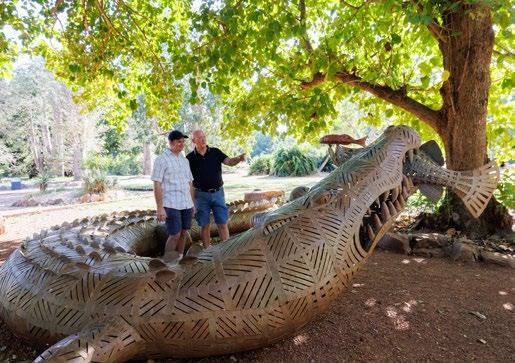
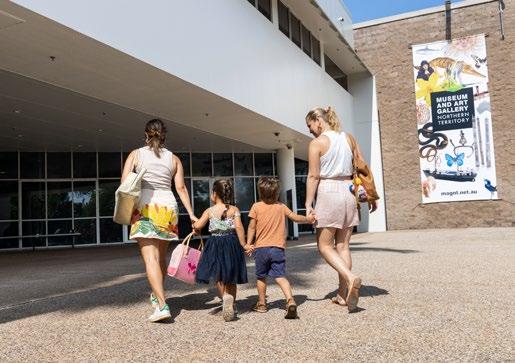
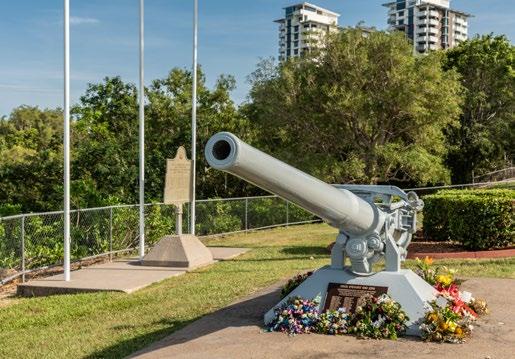

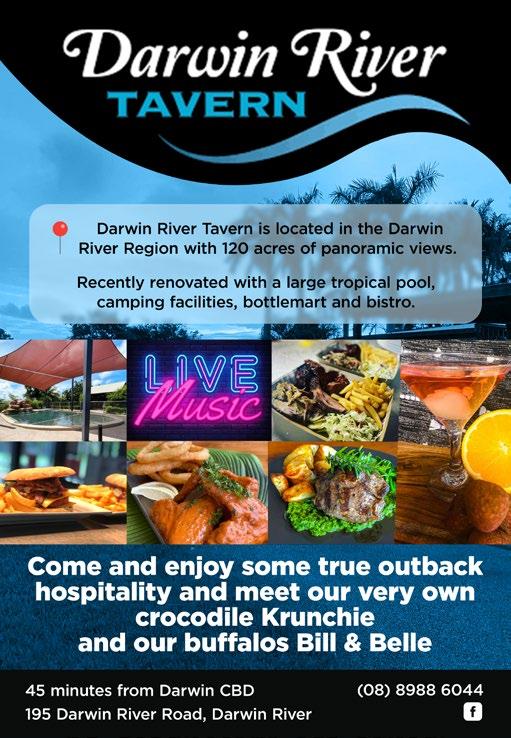
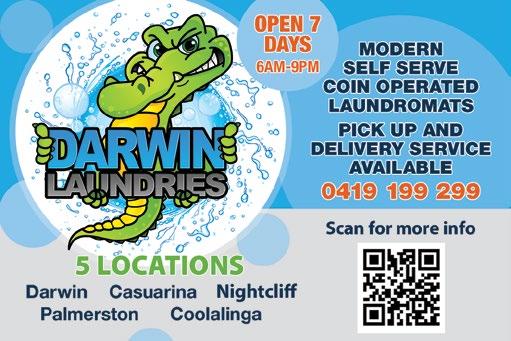


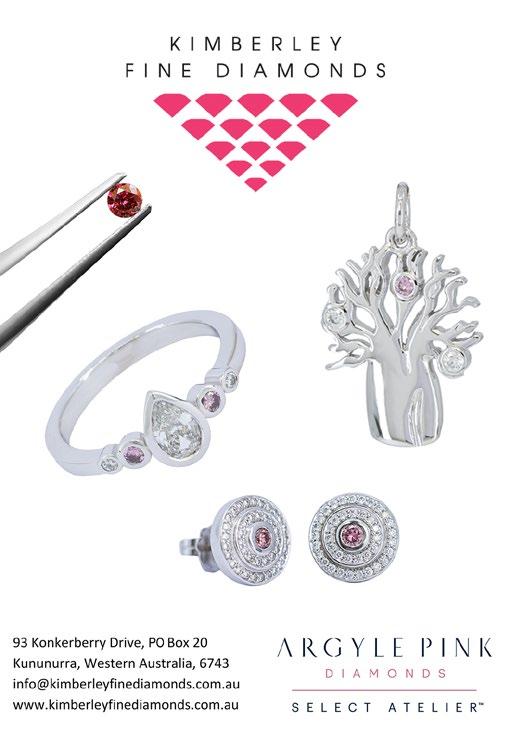
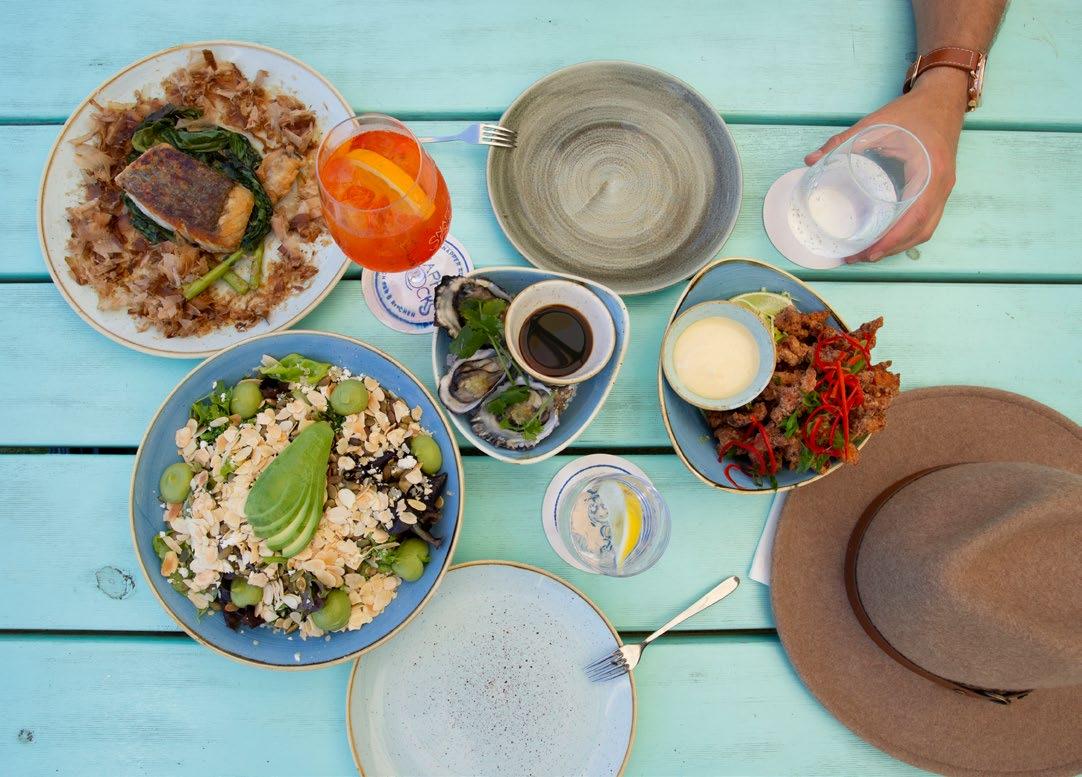
Darwin’s diversity of cultures is evident all over the city. Being so close to Asia, there is a very strong influence on foods from that continent, however there is also heavy influences from other parts of the world as a result of the arrival of people seeking to make Australia their home.
While Mitchell Street is the place well known for food and entertainment there are some hidden gems around Darwin that offer really high quality.
The CBD is famous for world class restaurants including Moorish, Meraki’s, Pepperberry, Hanuman’s, Char and the Darwin Club but the list goes on and there are many great places to try in the city.
The Waterfront is another great place for dining and has multiple restaurants, but make sure you book, particularly in the Dry because these restaurants are always filled to capacity.
Near the Waterfront is the Darwin Jetty, which is home to some spectacular eating places such as the Jetty Restaurant. Sit and enjoy the gorgeous sunsets, the fish swimming and the warmth of Darwin as you sip on a glass of wine or a cold beer.
The entire area of Mindil Beach is inspiring when it comes to food and beverage, the markets, the Casino, the Ski Club and the Sailing Club all represent fantastic food. Just remember that if you are planning on grabbing something at the markets, that you need to take your own alcohol as it is not sold there.
For those looking for a more upmarket experience, then try Pee Wee’s at the Point on East Point.
For beer lovers, try One Mile Brewery in Winnellie or take a drive to Noonamah, Humpty Doo or Berry Springs and enjoy some cold amber fluid in one of the hottest cities in Australia. Casuarina Club, Buff Club, Cazaly’s Club and Good Times Bar & Grill offer some great bistro meals at reasonable prices.
The Cav, The Tap, Shenanigans, Six Tanks are all in Mitchell Street and most of them offer live music, a wide range of drinks and classic meals. The lively atmosphere in Mitchell Street is very alluring and visitors often find themselves out until the small hours of the morning.
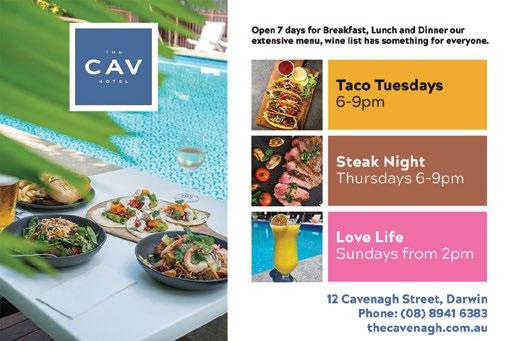
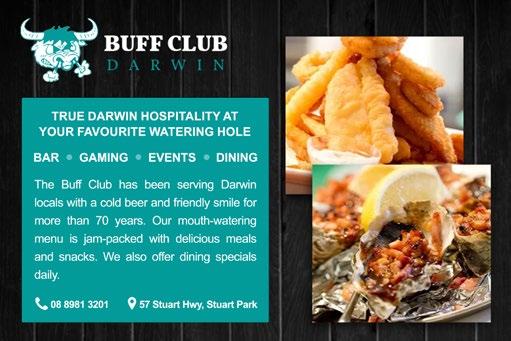
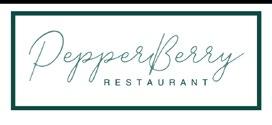
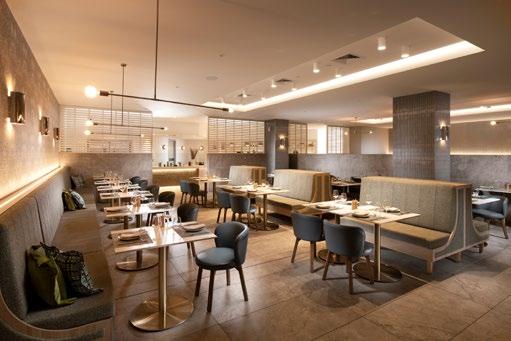

@pepperberryrestaurant
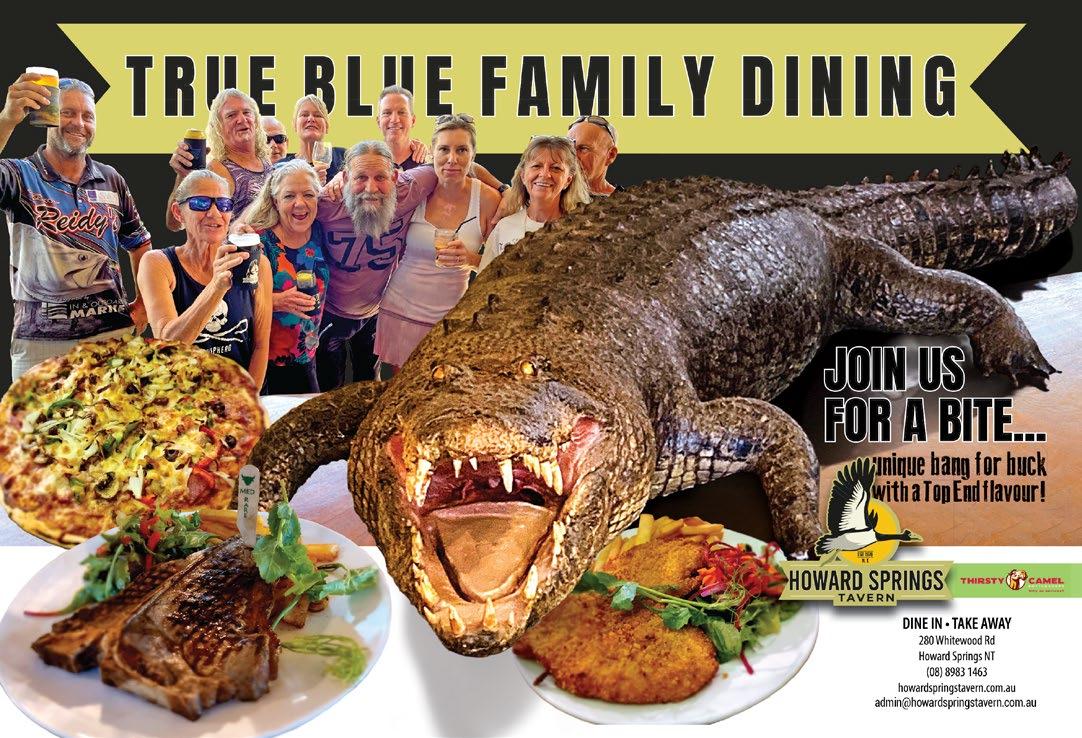
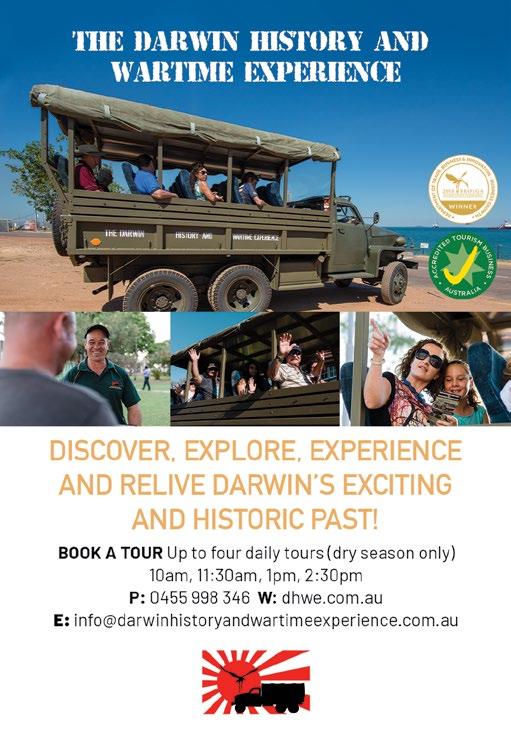
The Darwin History and Wartime Experience offers a fun and informative tour around the city of Darwin in a genuine WWII army truck. This is a great introduction to Darwin with a comprehensive overview of the city and its history.
See historic sights such as: Government House, Fort Hill Wharf & Harbour, Parliament House, Ammunitions storage bunkers, East Point Gun Battery & Military precinct, Antiaircraft gun emplacements and the 1934 QANTAS hangar.
The museum boasts WWII relics and memorabilia, while the Defence of Darwin Experience provides an enthralling and interactive showcase of Darwin’s war history. Learn about pre-war Darwin, the WWII bombing of Darwin, the devastation of cyclone Tracy and the colourful characters of the past that made Darwin what it is today. Pick-up outside the Darwin Information Centre.
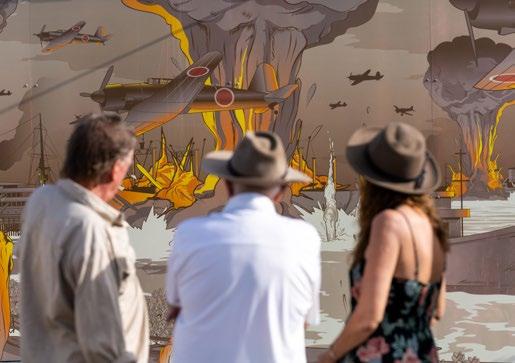
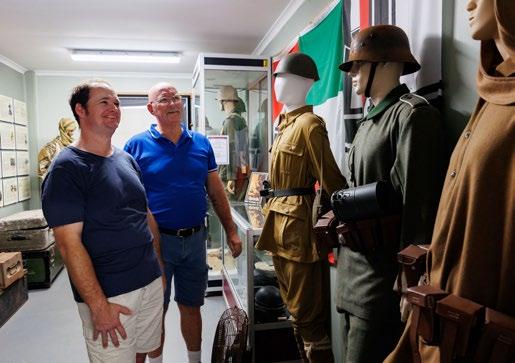
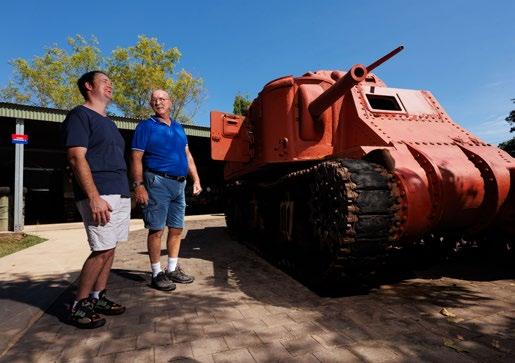
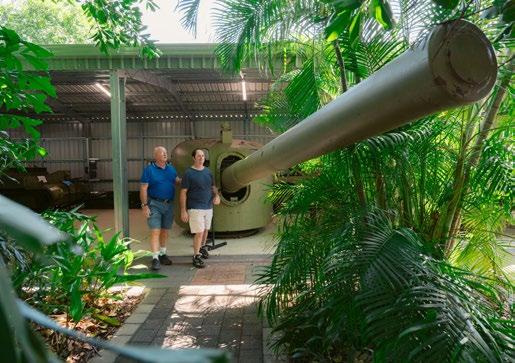
Cullen Bay may fly under the radar when it comes to dining hotspots, but it’s arguably one of the best places in Darwin to enjoy a meal. The pace is a little slower here, making it ideal for relaxed dining. Visitors can stroll along the waterfront, browse menus at leisure, and easily find a table with a view.
Yot’s and Damsquino’s are both standout venues, known for their quality cuisine and welcoming atmosphere. Whether you’re after fresh seafood, Mediterranean flavours or modern Australian fare, there’s something to please every palate.
Lola’s adds a splash of colour and fun to the dining scene, with its circus-themed décor, vibrant cocktails and upbeat vibe. It’s a favourite for both locals and visitors who enjoy an experience as much as a meal.
Perhaps the most iconic restaurant in Cullen Bay is Seafood on Cullen, a sprawling seafood venue that boasts uninterrupted views of the harbour and unforgettable sunsets. With its spacious outdoor veranda, this family-friendly restaurant offers a casual yet scenic dining experience. Kids can stretch their legs and play on the nearby grassed area, all within sight of their parents enjoying a drink or meal on the deck.
Beyond the restaurants, Cullen Bay’s marina setting enhances the dining experience - yachts bob gently in the water, and the salty breeze adds a touch of coastal charm. Whether you’re after a romantic dinner, a fun family outing, or just a relaxed evening by the sea, Cullen Bay delivers with quality food and laid-back vibes.
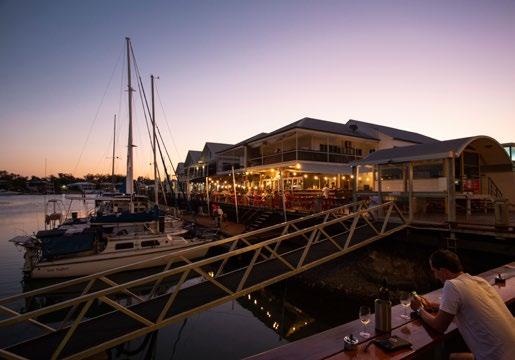
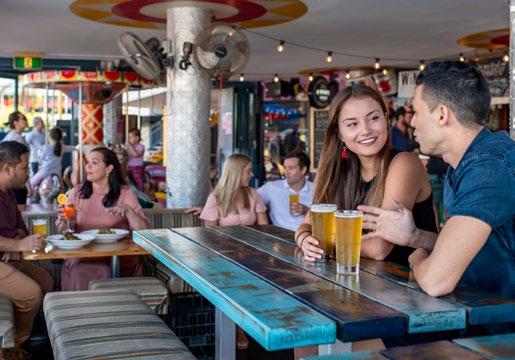
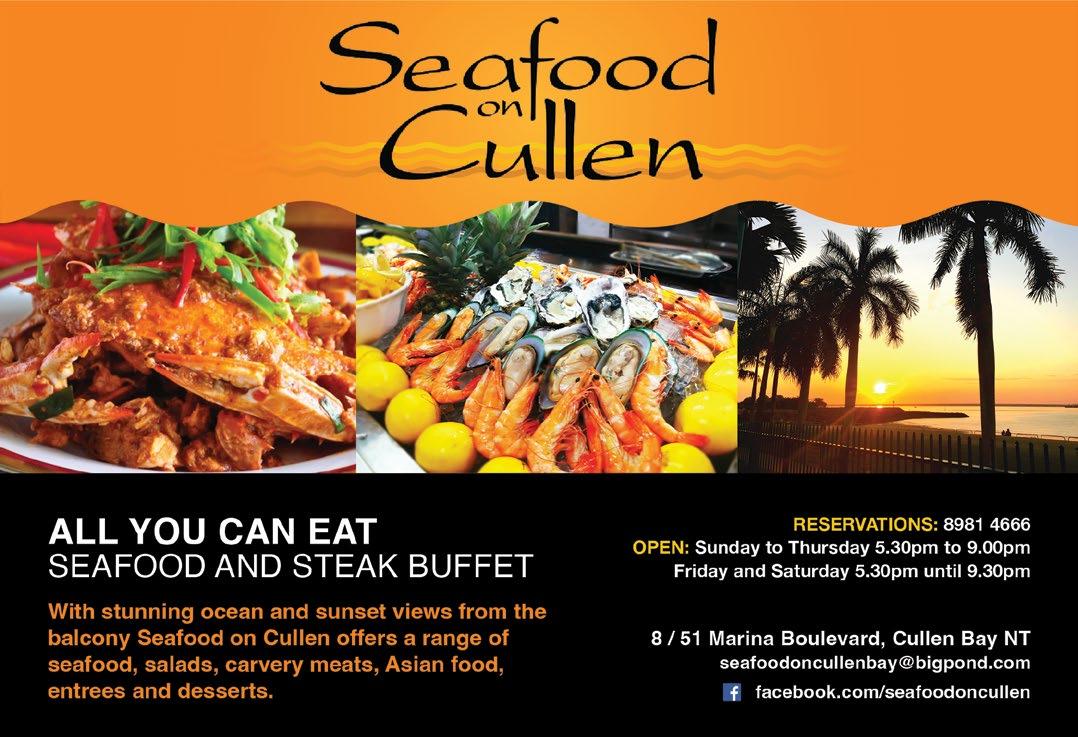
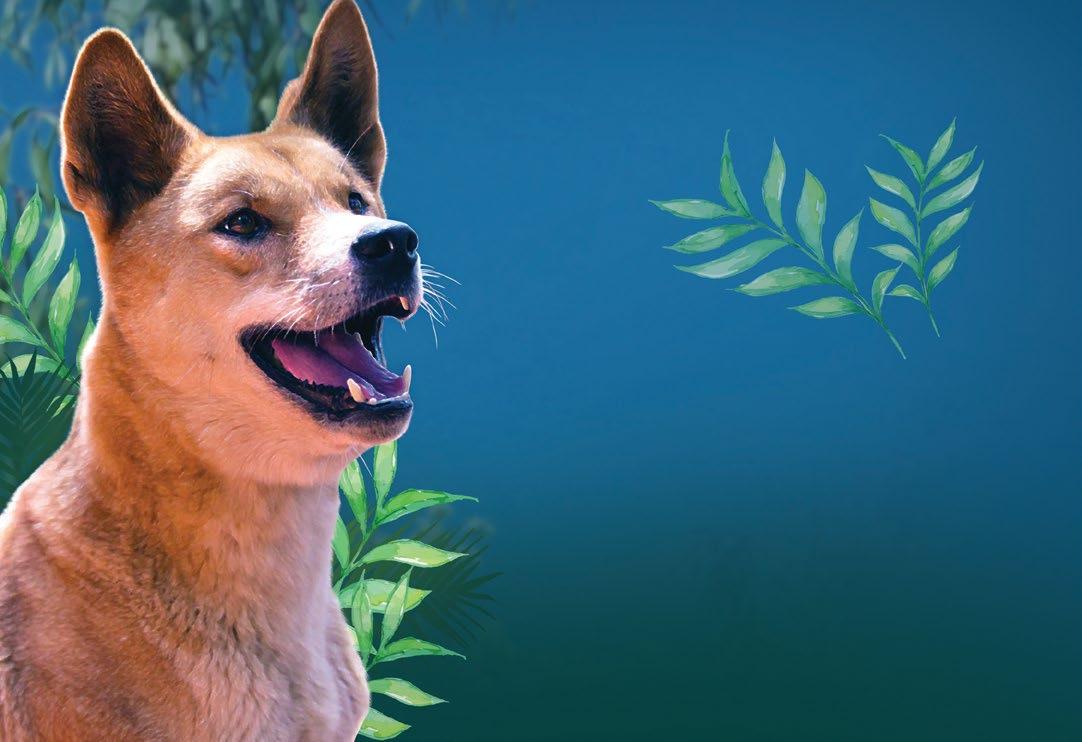
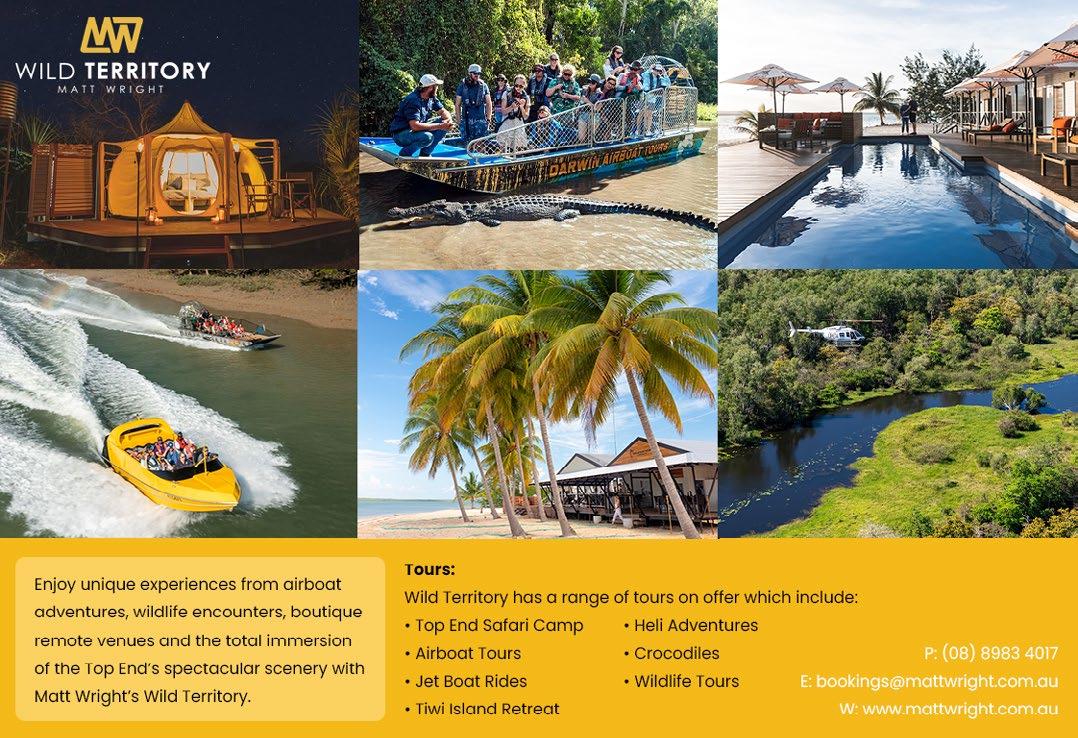

The Territory Wildlife Park is your ultimate Darwin wildlife experience! The Park showcases the natural wonders of the “Top End” where you’ll see the animals and natural habitats of this place we call home. You’ll be amazed by the picturesque beauty of the park, and appreciate that you can see the “Top End” in a few hours rather than a few days!
Here the wildlife exhibits are integrated within the natural environment, so you’ll see pelicans, freshwater crocodiles, fish and turtles happily cruising around a natural ‘Billabong’. You’ll meet hand-raised friendly wallabies in the ‘Woodland Walk’, and see a variety of water birds at ‘Goose Lagoon’.
In the air conditioned aquarium you’ll take a journey from the small rock pools of the Arnhem Land Escarpment, down through streams and tributaries, into the larger rivers of the “Top End”, and then out to the coral reefs. A tunnel exhibit allows you to ‘walk under a river’ where freshwater whiprays, barramundi and a host of other fish swim over your head. You’ll also meet ‘Graham’ the 4 metre crocodile, resident at the Park for over 25 years.
If birds are your fancy, a walk through the Monsoon Forest aviaries will not disappoint. 12 walk-through aviaries are beautifully landscaped to show detail and diversity. Highlights include the brightly coloured Gouldian finches. A large dome aviary filled with hundreds of birds concludes the sequence as visitors walk a spiral down to the ground through the tree tops on an elevated boardwalk.
The Nocturnal House is another must-see featuring many animals that are not found in zoos or wildlife parks anywhere else in the world! Special lighting turns day into night allowing
visitors to witness the cryptic creatures of the ”Top End” night going about their normal activities. Inhabitants include rock wallabies, possums, quolls, snakes, lizards, frogs, owls and nightjars. The cool comfort of the Nocturnal House makes it a popular place to slow the pace and see creatures that are not often seen.
The Park is large with almost 8 kms of well-developed walking tracks for those interested in a full exploration. Courtesy hop-on-hop-off Shuttle Trains run regularly to transport visitors comfortably to attractions, and a fully stocked and air conditioned café produces a range of delicious goodies.
The Park has a range of Keeper Talks and Presentations that change throughout the year. Make sure you arrive in time for the Flight Deck presentation where you will see a free flight bird display like no other! You can book an extra special up-close encounter with some of our animals. Feeding nectar to sugar gliders in an unforgettable VIP experience at the Nocturnal House, handfeeding freshwater Whiprays at the Oolloo Sandbar, or feeding fish to rowdy Pelicans at the Billabong are just some of the options.
For the ultimate Top End experience, chose a day trip to the Territory Wildlife Park! Plan your visit, experience animal encounters and book tickets online territorywildlifepark.com.au
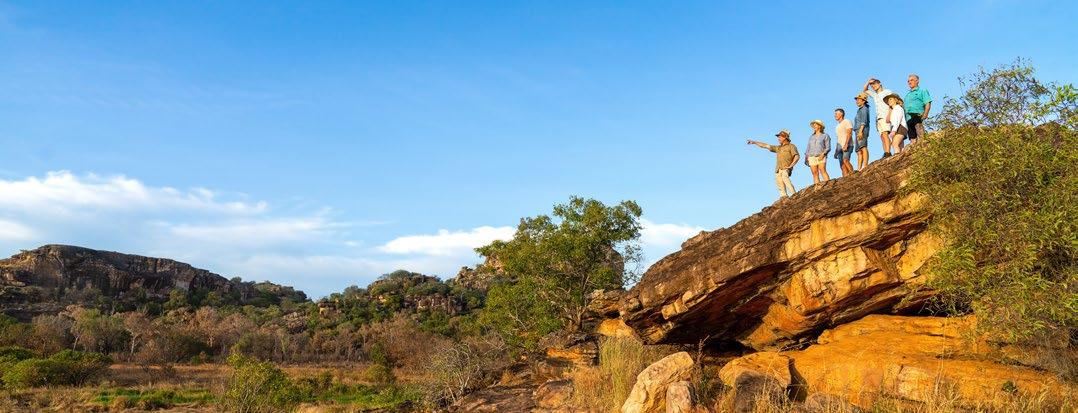
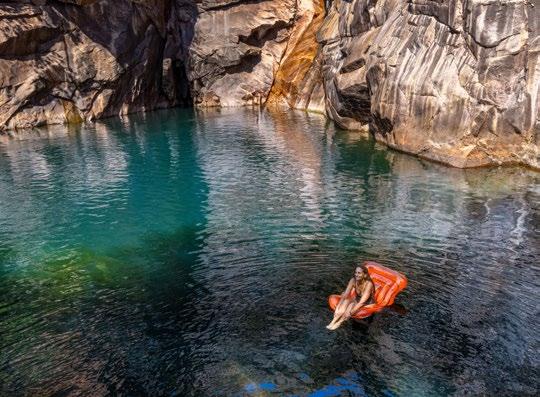

Extending over 20,000km2, Kakadu National Park is a landscape of contrasts. This iconic park is World Heritage listed, renowned for both its cultural and natural values.
The largest national park in Australia boasting rugged escarpments, lush rainforest, breathtaking waterfalls and rock pools, culture and one of the greatest recorded concentrations of rock art anywhere in the world.
To enter the park entry fees apply to visitors to help preserve Kakadu’s World Heritage listed natural and cultural sites and provide better services and facilities.
A fee applies to all interstate and international visitors aged 5 years and over. All Northern Territory residents with proof of identification are exempt. For more information on the cost of park passes, please visit www.kakadu.com.au
Take in the wonder of this beautiful location at these top spots.
A great first stop on your Kakadu adventure is the Bowali Visitor Centre where you can get advice on your trip and learn about the plants, animals and landscapes you will see in the park. Located on Kakadu Hwy, Jabiru. Open daily from 8am to 5pm.
GUNLOM PLUNGE POOL
This picturesque waterfall is one Kakadu’s most spectacular and popular places to visit. Here a cascading waterfall joins up with a tranquil plunge pool to provide a stunning backdrop for relaxing, swimming, and enjoying a picnic. 4WD only. Check seasonal access.
JARRANGBARNMI (KOOLPIN GORGE)
A stunning gorge hidden in the southern region of Kakadu. Permit required to enter this area, apply at least 7 days in advance. 4WD only. Check seasonal access.
Whether the falls are raging with water or just trickling, this majestic waterfall is a sight to behold. This 200 metre cascading waterfall is one of the best-known attractions. Best seen by air during tropical summer when heavy rains send huge volumes of water crashing into the gorge below. 4WD required. Check seasonal access.
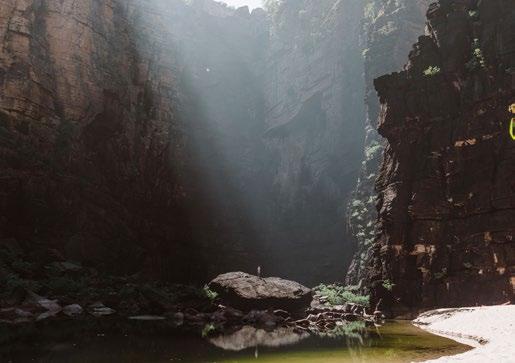
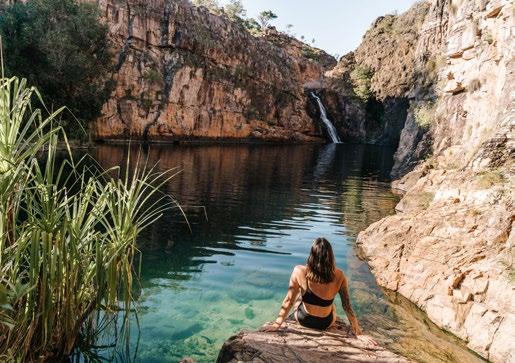
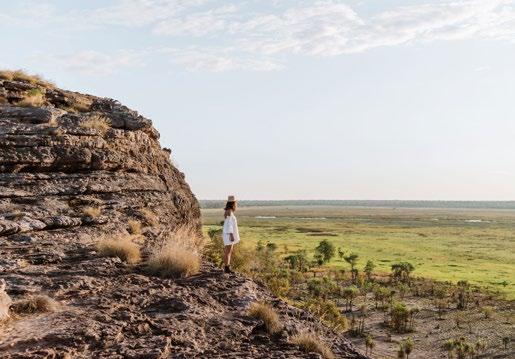
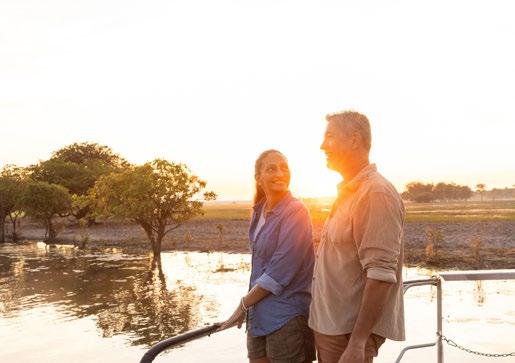
A bird-lovers paradise, here you will see a haven of bird life including magpie geese, kites, comb-crested jacanas, cormorants, willie wagtails, purple swamp hens, finches and kingfishers. It is an easy walk from the carpark. Check seasonal access.
Maguk is a pristine waterfall and plunge pool at the base of steep gorge walls. A 1km walk through monsoon rainforest leads to the base of the beautiful plunge pool. Check seasonal access.
The rock walls at Nourlangie have served as both a shelter and canvas for Aboriginal people for thousands of years. The paintings can be reached by the circular 1.5km rock art walk.
Along with Jim Jim Falls, Twin Falls is one of Kakadu’s big two waterfalls. Twin Falls gorge has a split cascade that plunges from a 150m high cliff face into a deep pool. You can see the falls via the boat shuttle. 4WD only. Check seasonal access.
Ubirr is one of Kakadu’s two most famous Aboriginal rock art galleries. The galleries can be viewed by following an easy 1km circular walking track. Check seasonal conditions.
WARRADJAN ABORIGINAL CULTURAL CENTRE
Spend some time at the Warradjan Cultural Centre learning stories that inspired Aboriginal laws and explore the extensive exhibit of tools, message sticks and artworks. Open daily.
Yellow Water is one of Kakadu’s best-known landmarks. Take a cruise through these wetlands and experience the lush scenery and thriving wildlife that inhabits the region. Book a fishing tour to try your hand at catching Kakadu’s resident barramundi. Check seasonal conditions.
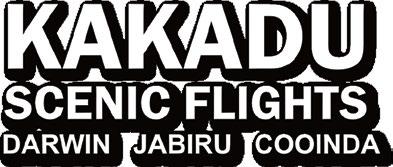

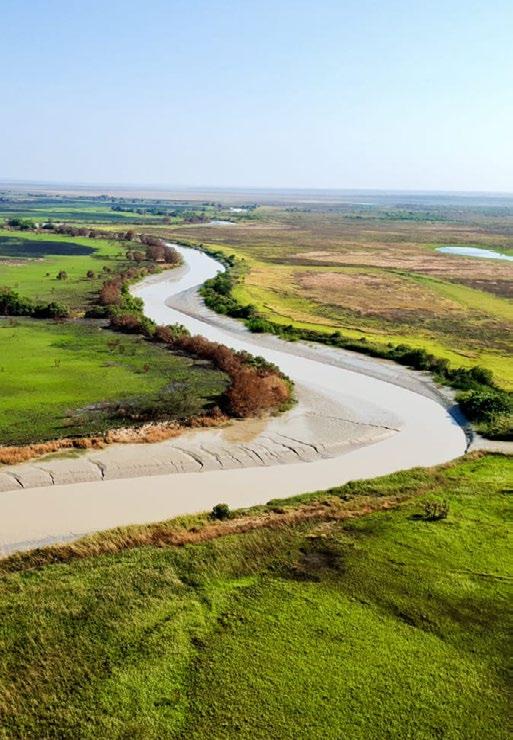


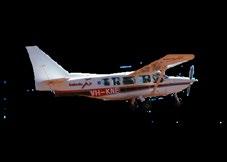



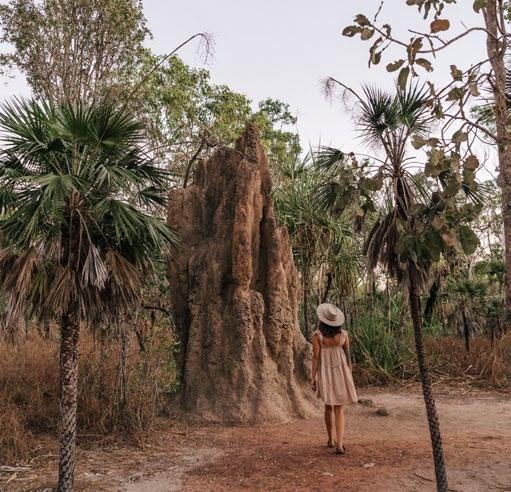
National Park
Litchfield National Park is just an hour and a half drive from Darwin and features a range of diverse environments.
Batchelor, known as the gateway to Litchfield National Park, is located 98 kilometres south of Darwin. Batchelor falls into what is called the Rum Jungle region and was named after a bullock wagon loaded with Rum was bogged on its way to construction gangs and the drivers of the bullock train drank its bounty.
The town was named officially during the war years and became notable when in 1933 the airstrip was expanded through plans to protect southern Australia from the pending Japanese invasion.
There is a wonderful little museum in Batchelor as well as a visitors centre and a Butterfly Farm. Supplies at the Litchfield Resort are plentiful and meals can be purchased at the Butterfly Farm or the resort.
BAMBOO CREEK & WALKER CREEK
Relics of the mining era can be seen at Bamboo Creek Tin Mine. The Walker Creek Walk, which is two hours in duration, is also worth checking out. 2WD accessible.
BLYTH HOMESTEAD
The historic Blyth Homestead is the location of an old tin mine and serves as a reminder of the tough conditions faced by pioneers in remote areas. 4WD only. Check road conditions. Open daily.
BULEY ROCKHOLE
Buley Rockhole is a series of waterfalls and rock-holes, where you can find your own spot to swim and relax. Camping is available with toilet facilities and fees apply. 2WD accessible. Open all year round.
FLORENCE FALLS
The spectacular Florence Falls cascades into a plunge pool, which sits within a pocket of monsoon forest. 2WD accessible. Open all year round.
GREENANT CREEK WALK
Greenant Creek Walk tracks through rainforest to another attractive plunge pool. 2WD accessible.
MAGNETIC TERMITE MOUNDS
One of the park’s unique sights is the many termite mounds standing up to two metres in height. 2WD accessible. Open all year round.
SURPRISE CREEK FALLS
Surprise Creek Falls is a place to relax and enjoy a swim in an uncrowded waterfall. 4WD only. Check road conditions.
TOLMER FALLS
Tolmer Falls cascades over high escarpments into a deep plunge pool. 2WD accessible. Open all year. No swimming due to flash flooding risks and saltwater crocodiles.
THE LOST CITY
These impressive freestanding sandstone blocks and pillar formations bring to mind the ruins of a long-forgotten civilisation. 4WD only. Check road conditions.
TJAYNERA FALLS (SANDY CREEK)
Nestled in an open valley, the falls can be found by walking along a 1.7km trail. 4WD only. Check road conditions.
WANGI FALLS
One of the best and easiest waterfalls to access and enjoy. A large deep-water pool where you can swim right up to the falls. An interpretive walk to the top of the falls commences near the pool. An art centre and café are also available.
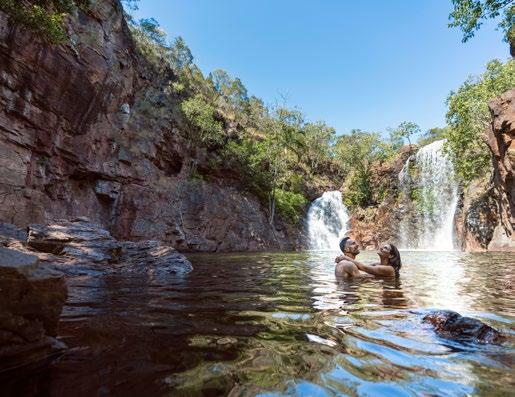
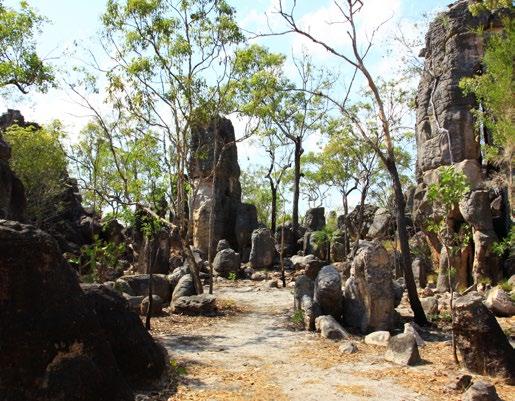
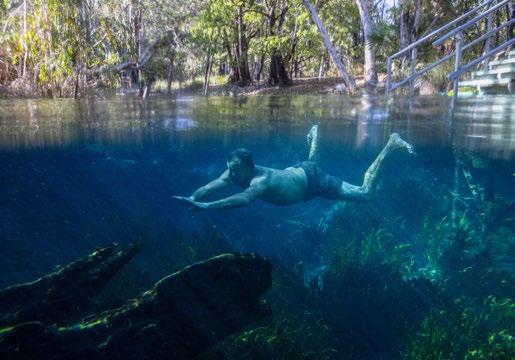
Covering an area of over 13,000ha, Elsey is a wonder of the world. With the Roper River extending from Korowan (Mataranka Falls) to the gorgeous Mataranka Thermal Pools, visitors can spend days in the region just exploring and discovering unique fauna and fantastic history.
There are some strict rules about swimming in the park and these days swimming is only allowed at Bitter Springs and Mataranka Thermal Pool. Remember that like many places in the NT, crocodile danger is omnipresent and visitors should always be cautious near waterways.
Walking trails include Bitter Springs, the Riverside Walk, Mataranka Thermal Pool, Stevie’s Hole, the Botanic Walk, Korowan and sheep dip. Most of these walks are realitively easy walks but remember that temperatures are hot and its important to carry some hydrating tablets and a bottle or two of water.
The Mataranka Thermal Pool is great for the family, with man-made steps and a waters that boast 34 degrees all year round and visitor entry is easy.
Accommodation options include high quality hotel style to cabins and both powered and unpowered sites.
Pine Creek is an interesting little town and boasts a look out over the lake that keeps the town green and watered.
Originally established as a gold town and which boasted a bustling immigrant community. Imagine a town in the late nineteenth century which was steeped in culture, diverse language and rags to riches wealth.
Later, the town became a key location in the Second World War, when an airfield and hospital were constructed to protect the Japanese invasion from the rest of Australia.
Today, Pine Creek is more of a cool hang out for passers-by who are wanting to enjoy a cold beer, a slow pace and just a great ambience.
Visitors should be sure to look out for the goldrush festival complete with the NT Gold Panning championships and Didgeridoo Jam. The Pine Creek Rodeo is usually held in August and is a must do for those of lovers of all that is famous in the Territory.
Formed millions of years ago, the caves are located in an area covering 1499 hectares and is a limestone wonderland. The caves form part of the rich, local culture and today, visitors can pay a small entry fee and experience this unique, natural wonder.
The Cutta Cutta Caves are a tropical cave system and are therefore full of wildlife including different bat species and 170 species of birds including the endangered Gouldian Finch.
The caves are located 27km south of Katherine and on the way to Mataranka. Although the park is quiet and seems remote, the caves are a highly regarded attraction and bookings are essential as tours sell out.
Part of Jawoyn country, the locals will take you through the caves and provide you stories of a wonderful, deeply cultured history.
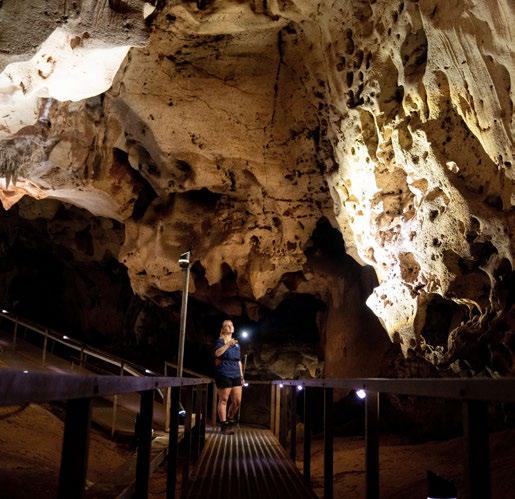
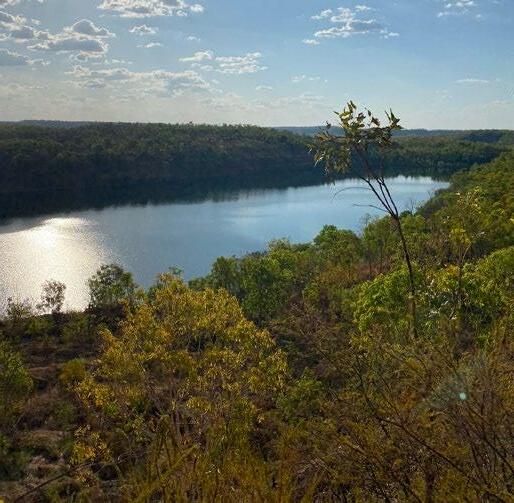
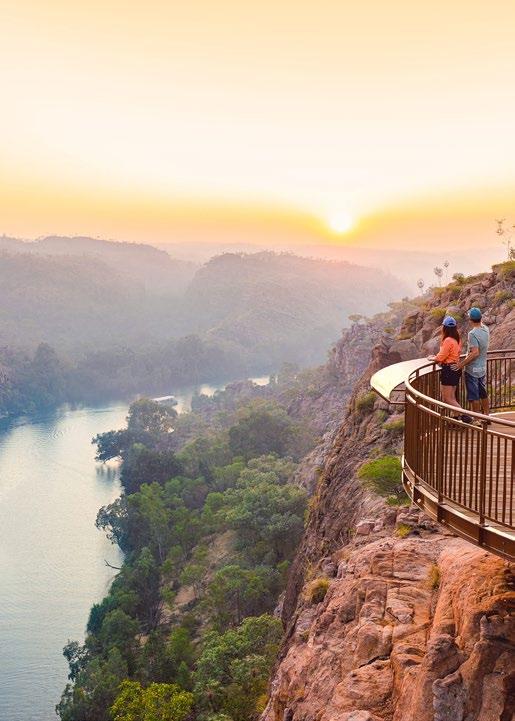

Driving through Katherine, many people think they are just passing through another outback town, but don’t be fooled Katherine has quite a bit going on. It boasts some great eating places try Kumbidgee Restaurant on the Gorge Road for world class quality, plus some of the best quality Aboriginal art you are likely to find anywhere. There are wonderful shops and galleries and a must do is Mimi Aboriginal Art Gallery which is run entirely by local people. Even for those not wanting to buy, it’s a great place to drop in for a yarn and learn about the local culture first hand.
Katherine is a region that encompasses the township of Katherine as well as the renowned Nitmiluk National Park. In the 1800s, explorer John McDouall named the Katherine River after the daughter of the man who sponsored his expedition. Her name was, in fact, spelled with a ‘C’ but this typographical error was never amended. The region and township followed suit. The Jawoyn people, the land’s traditional owners, renamed the region ‘Nitmiluk’ in 1989, which translates to cicada place.
Nitmiluk (Katherine) Gorge is world famous and visitors can expect one of the most interesting experiences they are likely to find. The Gorge is the land of the Jawoyn people (pronounced “jar-whn”) and employs locals, with the money going back into the community. Since returning to traditional ownership only a few years ago, the visitors centre at the Gorge has been developed to a world class facility offering a newly created, interactive museum which was hand made by local artists.
Located 45 minutes from the township of Katherine, boasts unique and unforgettable landscapes which can be travelled and explored on foot, by water or from a bird’s-eye view.
The Nitmiluk Visitor Centre should be your first port of call. Situated at the entrance of Nitmiluk Gorge, the centre has a Display and Heritage Museum that provides a history lesson on the park to whet your appetite for things to come. Enjoy refreshments from the cafe and buy a memento to remind you of this wondrous region or pick up your ticket for one of the famous gorge cruises, which often includes a swim in the cool, fresh waters.
Cruises should be booked well in advance and are a must if you are planning a visit to Katherine. You can find this online and which is often better than calling as the phones are sometimes not available.
The Katherine River bends and winds through 13 spectacular gorges in the park, a feat of nature which makes this destination a much loved one for Australians and overseas visitors alike. The Jatbula Trail which extends 58 kilometres through the park offers an aweinspiring hike that traverses monsoon rainforest, stunning waterfalls and Jawoyn Aboriginal rock art. Both the Northern and Southern Rockholes are the perfect place to cool off on a hot day while you watch their mesmerising waterfalls.
Experienced trekkers and lovers of walking trails are likely to already know about the Jatbula Trail because it is one of the top five walks in Australia. Every dry season, visitors plan this walk which is 4 nights and 5 days starting close to the Nitmiluk Visitors Centre and then ending at Edith Falls.
The longest leg is 17km between 17 Mile Falls and Sandy Camp and the shortest is 11km on the first day as you depart and head towards Biddlecombe Cascades.
Walkers depart every day and can enjoy stunning fresh water to swim in throughout the trek. All campgrounds along the trail are near permanent water with a provided toilet at each campground.
Although safe to drink, it is suggested that water taken from the track be boiled or have purification tablets added.
The hiking season runs from 1st of June to 30th September each year and bookings are taken from November the year prior. Look online at nt.gov.au for more information on the Jatbula.
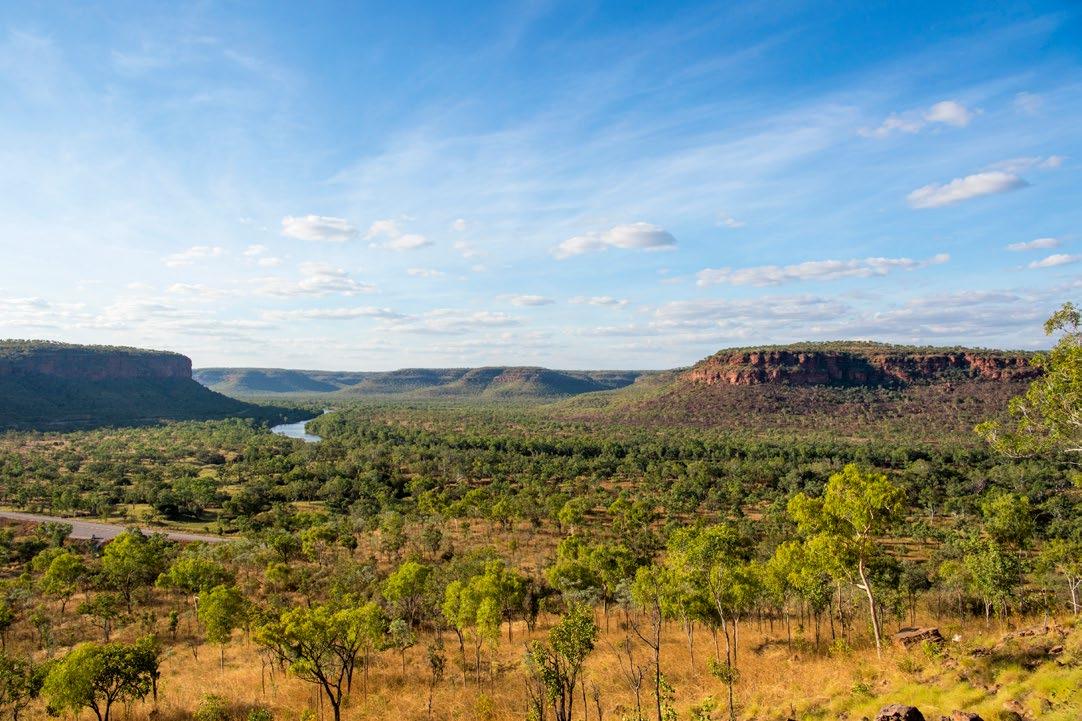
TRAVELLING WEST
Travelling from Katherine across to the WA border sees a real change in the landscape.
Driving from Katherine you can access fuel and accommodation at the Victoria River Roadhouse, which is alongside the stunning Victoria River and 194km from the town.
4WD tracks around Victoria River are amazing as the landscape changes from bush scrub to stunning rock formations and interesting flora and fauna. The Judbarra/Gregory National Park is one of the most unique and gorgeous places on the planet. The remoteness and stunning landscapes are awe inspiring.
Barramundi fishing is extremely popular in the area and particularly as you head in towards the Timber Creek region. Just remember that these rivers do have crocodiles and caution is always mandatory.
Timber Creek is a great place to stop and stay for a while and although the town is tiny, it has a medical centre, supermarket, hotel and various accommodation options as well as free camping at Big Horse Creek Campground on the Victoria River.
Be sure to go and see the Timber Creek Police Museum which reminds us of the atrocities that were dealt to local Aboriginal people particularly between the years of 1908-1935. Gruesome stories tell of cruelty dealt out to the locals in an effort to eradicate the area and which included torturous acts such as being tied up under the full sun for days at a time.
The Nackeroo Monument is a memorial to what is also known as Curtains Cowboys, which were soldiers that were stationed in the area to protect northern Australia from invasion during the second world war.
Birdwatching in this area is regarded as some of the best in the world, hundreds of avid bird watchers come from all over the globe to spot some of the remarkable bird life found here. There is only a handful of professional bird watching guides for the area, so it is worth doing some research before you head to Judbarra/Gregory National Park. Ask at the Timber Creek Hotel, which is very much the hub of the town.
Hiking, birdwatching and fishing are the most popular activities in the area and in April or May each year, hundreds of ladies show up for the famous Alure Ladies Fishing Classic where the fishing is taken very seriously in a catch and release competition that lasts for two days.
Travel on further west and just 48km before the Western Australian border you can turn off to Keep River National Park. Despite appearances, Keep isn’t a fishing place, but an awesome look at the outback. Bushwalks are gorgeous, but the hidden gem is the famous Aboriginal Rock Art.
Camping in the Keep is permissible although there is limited drinking water and facilities are basic. It is advised to contact the ranger if you plan to spend more than a passing day in the Keep (08 9167 8827).
The entire Top End is literally scattered with truly amazing galleries.
Indigenous galleries are prolific and almost all of them offer genuine product that is locally sourced and made. Readback Gallery in the mall, Mbantua Gallery, Sister 7, Aboriginal Fine Arts, Paul Johnstone Gallery, Mason Gallery are all amongst the most well known galleries in Darwin.
Aboriginal Fine Arts is one of the Territory’s most established galleries and visitors here can chat to a local and purchase from a massive range. The gallery is a little tricky to find and is upstairs on the corner of Knuckey and Mitchell Street. It is a very large gallery and there are literally thousands of pieces of art on display.
Sister 7 is another treasure and is focussed on local female artists who spend time in the gallery painting and sharing their stories through the medium of art. Here you are welcome to come in for a chat and browse the gorgeous paintings that are being created right in front of your eyes, or on the wall for you to enjoy.
The Museum and Art Gallery Of The Northern Territory (MAGNT) is highly regarded and is without doubt the best museum in the NT.
Heavily influenced by the ancient culture of the Top End, MAGNT does what hundreds of galleries around the globe are unable to do and that is that it connects on a local level as well as offering a spectacular showcase in a worldclass facility.
For art lovers, MAGNT is a must and provides multiple exhibitions every year, many of which are free. Located in the Gardens beside Mindil Beach, if you visit Darwin, be sure to check this out.
Tactile Arts is a particularly interesting pick too and is run by the Crafts Council of the NT which was amalgamated with the Craft Council of Alice Springs and Katherine. The facility was set up to support local artists and craftspeople and offers an eclectic variety of activities. Tactile Arts holds 12 exhibitions each year, showcasing Top End and other selected interstate artists. The public can join any of the 40-50 workshops held each year and get creative with all sorts of crafts, including the popular ceramic studio.
There are multiple studios at the Tactile Arts Centre which include ceramic, print/textile (on both paper and fabric) as well as glass and jewellery. Join the many artists who come to teach and interact with those interested in all things creative.
The Top End is a vast region and art can be discovered right across the area. In Katherine there are loads of choices too including Mimi Arts, Top Didj Art Gallery and Gallop Thru Time Gallery to name a few. Mimi Aboriginal Arts and Crafts is a wonderful place to stop and chat about history and learn some culture.
The Top End is the home of the didgeridoo, so here you can learn some really interesting facts surrounding the use of this timeless instrument which is used by men to share stories. Choosing a didgeridoo is something that buyers should consider carefully. Thought should be given to the fact that traditionally only men play the diggeridoo and when you purchase a didj, you need to remember that it is a sacred instrument to the local people. Always take the time to ask about the instrument and explain what you are doing with it. Gallery owners and staff will be sure to guide you through the significance of each piece. A good choice of didj means that you will have an item to treasure for a lifetime.
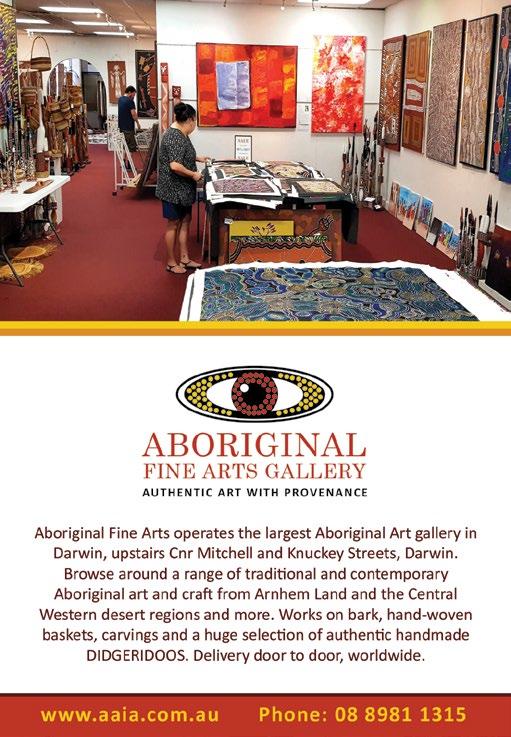
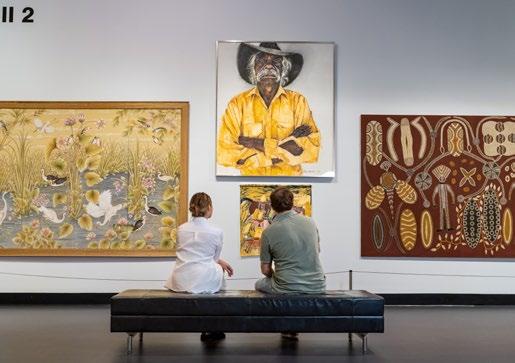
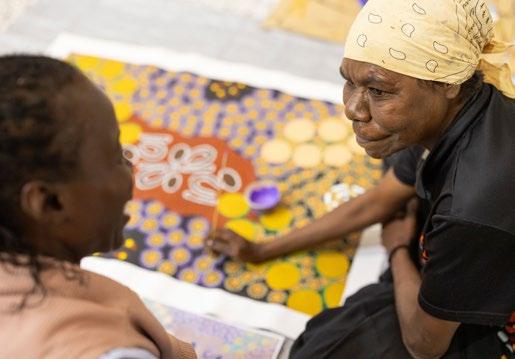
Aboriginal Bush Traders (ABT) is a vibrant retail, gallery and cafe located on the ground floor of the Charles Darwin Centre in Darwin’s Smith Street Mall.
The retail space sells everything from carvings, weavings and paintings to delicious bushfood pantry items, bush medicines, and fashion and beauty products. The gallery space also hosts an exhibition calendar with a new show every six weeks.
When you shop with us at ABT you are directly supporting NT remote Indigenous-led Art Centres and independent Indigenous artists who for most art is their sole income. At ABT we guarantee fair pay to those we support and true provenance of all products.
ABT is also a subsidiary of the Ironbark Aboriginal Corporation, a leading community development provider to urban, regional and remote communities throughout the Darwin Daly region in the Northern Territory.
Dot paintings, deep ochres and bright yellows are what we think of when we think about Indigenous art. The beauty of the way that the colours and lines intertwine is fascinating to the eye and a great talking point, but the art is so much deeper than just a few colours.
Dot paintings heed mostly from Central and Western Desert regions and although they are readily for sale in Darwin, the cross hatching or x-ray styles are more in keeping with the Top End.
Writing about Indigenous Art could go on forever, because the designs have evolved over thousands of years. The Dot paintings of Central Australia are truly amazing, because they could be overlayed with any of the landscapes around the MacDonnell Ranges and from the air, you probably wouldn’t notice a difference. The amazing thing is that these paintings were created by people who could never get a birdseye view and who instinctively knew how the landscape would look as they patiently drew their pieces of art.
The cross hatching of the Top End is used to represent reptiles and sea creatures which are often referred to in the Dreamtime stories passed on from generation to generation. These cross hatchings are often done with reed strands or actual hairs and were traditionally used in ceremonial paintings.
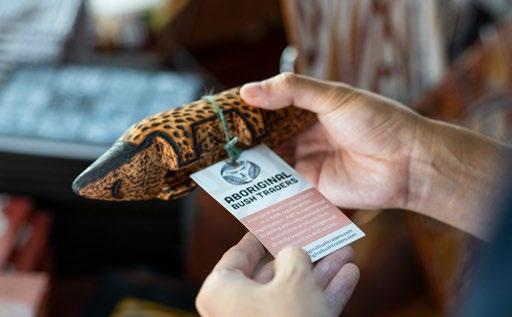

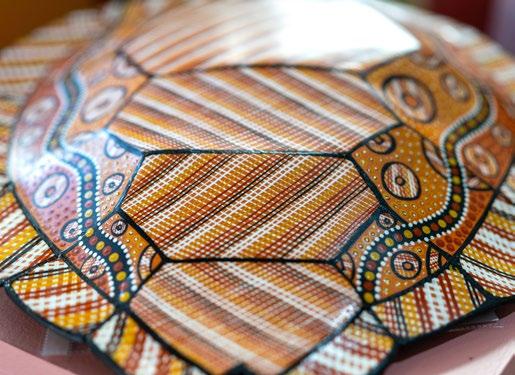

The Larrakia people are the traditional owners of the Darwin region which encompasses the Adelaide River in the east and the Cox Peninsula in the west. Like other Indigenous cultures, the Larrakia people have a strong connection to the land, and in this case the sea, with a heritage that spans many thousands of years.
In fact, the Darwin region has a longer history of Aboriginal habitation than originally thought. Recent archaeological discoveries near Kakadu National Park indicate that humans arrived to Australia at least 65,000 years ago, fifteen years earlier than previously recorded. Artefacts such as a sharpening tool and stone axes unearthed at the Madjedbebe rock shelter were a landmark find for archaeologists.
Aboriginal people are also said to be the world’s first astronomers. The Emu in the Sky is an Aboriginal constellation that relates to a dreamtime story about a man who kills and banishes the spirit of an emu to the Milky Way because it killed his wife. The Emu in the Sky extends its heavenly body all the way across the glittery Milky Way to the Southern Cross constellation. Not only do dreamtime stories impart rich life lessons to Indigenous people, they also explain the trajectory of planets and celestial bodies which have a practical link to the seasons.
In traditional practice, the Larrakia people follow six seasons which relate to the availability of bush foods: Gudjewg (January to February), Banggerreng (March and April), Yegge (May), Wurrgeng (mid June to mid August), Gurrung (August to October) and Gunumeleng (October to December).
Indigenous culture is celebrated through the Darwin region’s many Aboriginal galleries, cultural events and guided tours. Be sure to immerse yourself in this fascinating and ancient culture.
When travelling in the Northern Territory, visitors are reminded to obtain the appropriate grants to travel on Aboriginal land. Always check with local authorities or tourism operators and ensure that you obey signs.
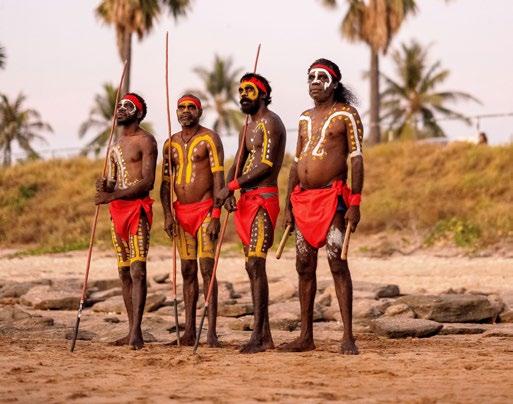
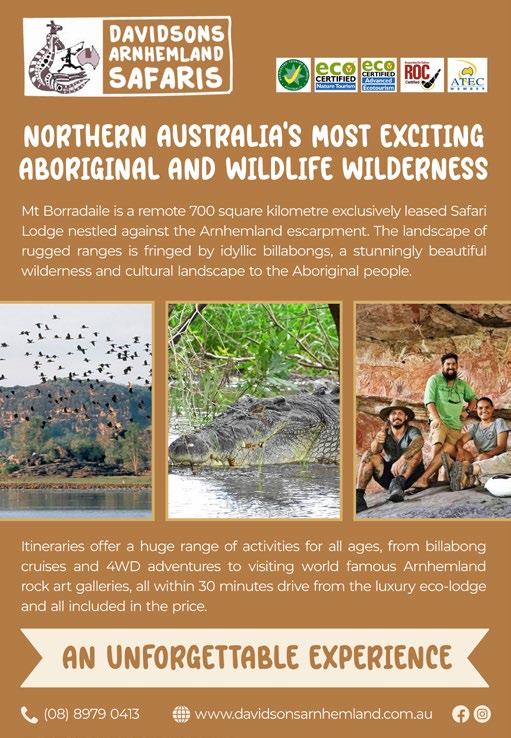
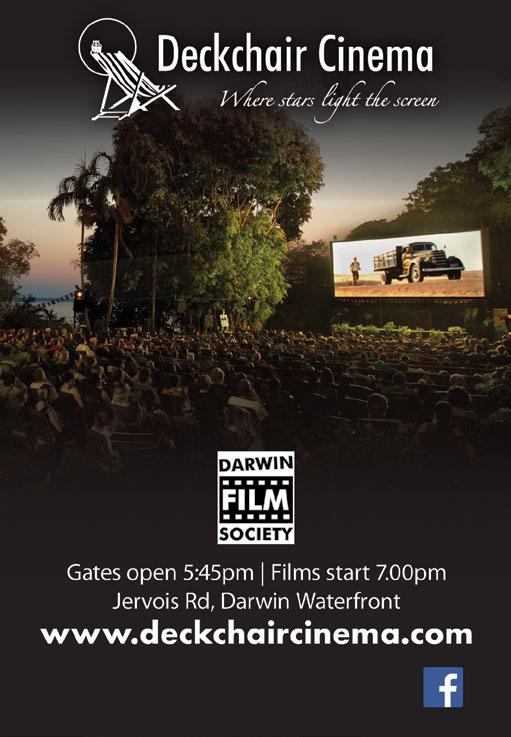
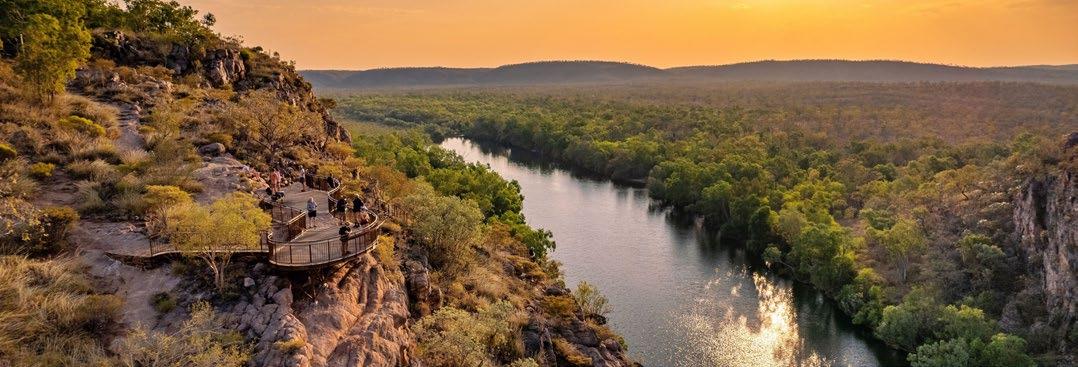
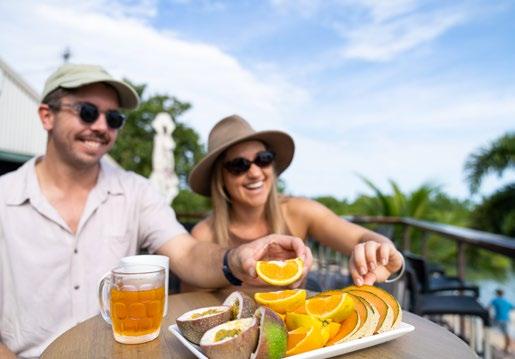

Crab Claw Island is a magnificent part of the Northern Territory located on the Cox Peninsula, just 135km southwest of Darwin by road, 15 minutes by air, or2 hours by quick boat. Truly unique, it is an island accessible by road except on extreme high tides. It is surrounded by 2500km2 of pristine waterways which include Bynoe Harbour, salt water estuaries and fresh water creeks and rivers.
Crab Claw Island is home to Crab Claw Island Resort. Nestled on the water’s edge, Crab Claw Island Resort is a relaxing escape from the everyday. The complex has elevated cabins overlooking a white sandy beach connected by walkways through the trees and palm gardens, refreshing swimming pools, an open air restaurant and bar with views across the harbour, private boat ramp to access the fabulous fishing, all surrounded by wildlife and pristine natural beauty.
Crab Claw caters for those who love the outdoors. You can go bushwalking around the island, hunt for monster mud crabs, go for a dip in one of the two refreshing pools or –when in season – watch the turtles lay their eggs on a nearby beach. However, Crab Claw’s main attraction has got to be fishing. The island is a fishing dream. A popular way to spend the day is to fish until dusk, and then eat your catch. With over 30 species of fish in the harbour, including Barramundi and crab, you’re spoilt for choice when baiting dinner.
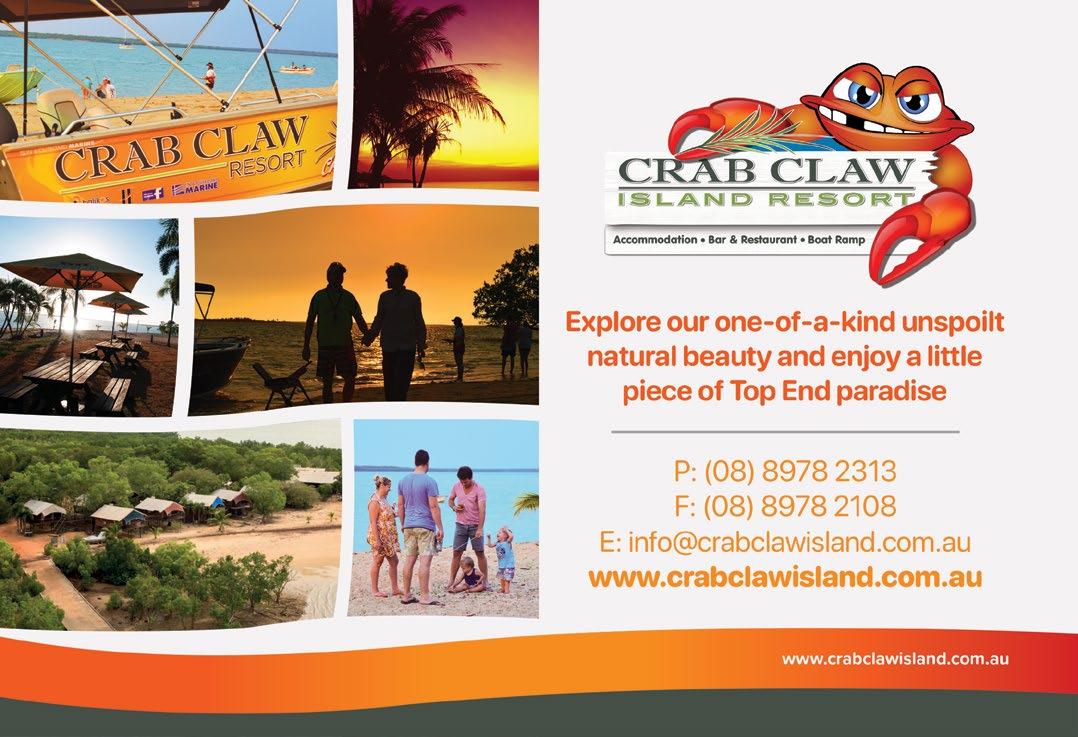
Bicentennial Park
Distance: 2.9 km Difficulty: Easy
Explore the scenic 2.9km out-and-back trail that winds through Bicentennial Park, located along the Darwin foreshore. This easy-grade path takes around 45 minutes to complete and is a popular route for walking, jogging, and road biking. While it’s well-frequented, you can still find quieter moments, especially in the early morning or late afternoon. The ideal time to visit is between January and September when the tropical climate is more comfortable. Dogs are welcome but must be kept on a leash.
Bicentennial Park is a central green space in Darwin and home to the city’s main war memorial, the Darwin Cenotaph. With sweeping views of Darwin Harbour, the park offers a pleasant mix of open lawns, shady trees, and well-maintained paths. Facilities include children’s playgrounds, outdoor fitness equipment, and seating areas. The trail is mostly exposed, so be sure to bring sun protection and stay hydrated on warmer days.
East Point Circular
Distance: 4.5km Difficulty: Easy
Discover the East Point Circular, a scenic 4.5km loop trail located in the inner northern suburb of Darwin. This easy-grade track typically takes around 1 hour and 5 minutes to complete and is popular for walking, running, and road cycling. Despite its popularity, the trail still offers moments of peace and quiet - especially during off-peak times.
The trail loops around the coastline of the East Point peninsula, which forms the eastern edge of the entrance to Darwin Harbour. It’s best enjoyed between March and August when the weather is cooler and drier. Please note that dogs are not permitted on this trail.
Along the way, you can learn about Darwin’s military history by exploring the preserved World War II artillery bunkers and other wartime relics scattered throughout the area.
Nightcliff and Casuarina Coastal Walk and Bike Path
Distance: 11.7 km Difficulty: Moderate
Enjoy this 11.7km out-and-back coastal trail in Darwin, suitable for walking, jogging, and cycling. While generally considered an easy to moderate route, the full distance may be more suitable for those with a reasonable level of fitness. On average, it takes about 2.5 hours to complete. The path is popular, but you can still find quieter moments throughout the day. Open year-round, it’s a scenic and enjoyable route in any season.
This shared-use path runs parallel to Darwin’s northern coastline, offering ocean views, sea breezes, and access to parks and beaches. It follows a landscaped green corridor beside the coastline, passing through reserves and suburbs such as Nightcliff, Rapid Creek, and Brinkin.
The path is fully separated from traffic, making it a safe and pleasant option for both commuters and recreational users. Whether you’re cycling to work or enjoying a leisurely stroll, it’s a fantastic way to connect with the coastline and local community.
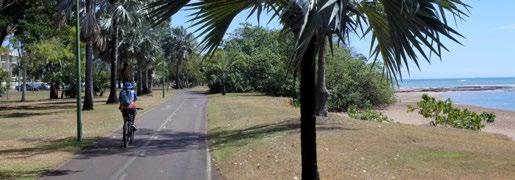
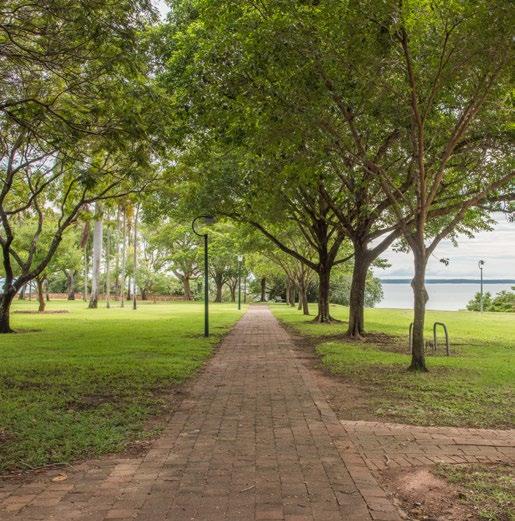
George Brown Darwin Botanic Gardens
Distance: 2.6 km
Difficulty: Easy
Explore this scenic 2.6km loop trail located within the George Brown Darwin Botanic Gardens. This easy-grade route takes around 35-40 minutes to complete and is a popular choice for walkers looking to enjoy nature close to the city. While it’s a busy area, especially during the dry season, the lush surroundings make it a peaceful escape. The best time to visit is between March and August, when the gardens are at their most vibrant. Please note that dogs are not permitted in the gardens.
Located just minutes from the Darwin CBD near the end of the Stuart Highway, the gardens span over 42 hectares and feature an impressive collection of tropical plants from northern Australia and around the world. The loop trail is one of several pathways within the gardens, and visitors are encouraged to branch off and explore themed areas, rainforest sections, and seasonal blooms.
Lee Point Beach to Casuarina Nudist
Distance: 4.6 km Difficulty: Moderate
This 8.5km out-and-back trail near Darwin takes about 2 hours to complete and is rated moderately challenging due to its length and varied terrain. It’s a quiet route ideal for walking, running, or hiking, with few other visitors. The best time to visit is during the dry season, June to October.
The mostly flat path passes through monsoon vine forest, eucalypt woodlands, grasslands, and includes a mangrove boardwalk. Mosquitoes are common in the afternoons, so bring repellent. The trail ends at Casuarina’s official clothing-optional beach.
Distance: 6.8 km Difficulty: Easy
Discover this easy 6.8km out-and-back trail near Darwin, which typically takes around 1 hour and 30 minutes to complete. Popular for walking, running, and road biking, the trail offers a peaceful experience during quieter times. The best months to visit are June through April, avoiding the wettest periods.
This route is especially enjoyable at sunset, following a well-maintained shared path from Nightcliff Jetty to Rapid Creek. Along the way, you’ll find plenty of shaded areas, parks, and outdoor exercise equipment.
The trail begins at Nightcliff Jetty, where there is ample parking, and heads east to the Rapid Creek Footbridge, ending near Trower Road.
January
Parap Village Markets - Saturdays from 8am-2pm
Oz Run
February
Travelling Film Festival Darwin
Bombing of Darwin Day
April
Darwin Waterfront Easter Saturday Celebrations
Deckchair Cinema Season (April - Nov)
Mindil Beach Sunset Markets - Thursdays & Sundays (April - Oct)
May
Garramilla International Food Fair
Freds Pass Rural Show
Darwin Street Art Festival
The Top End Gin Festival
Culture Fest
Darwin Waterfront Craft Fair
Nightcliff Seabreeze Festival
Bass in the Grass Music Festival
Banff Mountain Film Festival World Tour
Free weekly Yoga classes at the Darwin Waterfront - Saturdays 8am to 9am from May through to October
Darwin International Trade Show
Colour Frenzy Darwin
June
V8 Supercars Championship
Ocean Film Festival Australia
Sugarbag Festival
NT City2Surf
Darwin Beer Can Regatta
Darwin Waterfront Wave Lagoon Aqua Zumba – Sundays 9.00am from May through to October
iJuly
Top End Bull Spectacular
Royal Darwin Show
Deadly Cup Carnival
Darwin Fringe Festival
Territory Day
August
Nitro Up North
Darwin Cup
Darwin Festival
Darwin Aboriginal Art Fair
National Indigenous Music Awards (NIMA)
September
The Australian Veteran Golfers Union National Championships
MXGP of Australia
Ostojic Chariots of Thunder Sprintcar Series
Darwin International Film Festival (DIFF)
October
Million Dollar Fish Competition (Oct - March)
November
Hottest 7s NT Rugby Union
Melbourne Cup Day & Noonamah Frog Races
December
Darwin Waterfront NYE Spectacular
Free Community New Year’s Eve Event
Regular Event
Darwin Parkrun
Every Saturday at 7.00am
A free, fun, and friendly weekly 5km community event. Come along and join in, walk, jog, run, whatever your pace.
Please register before you first come along.
www.parkrun.com.au/darwin
Bicentennial Park (Esplanade) Darwin
For the most up to date Calendar of Events and dates, go to www.tourismtopend.com.au
Berry Springs Market
Berry Springs Hall, Cox Peninsula Road, Berry Springs. Last Sunday of the month from 8am to 12pm, March to December.
Coolalinga Central Market
Community market held at the air conditioned Coolalinga Central Shopping Centre. Every Sunday from 8am to 3pm.
Fred’s Pass Rural Market
Corner of Bees Creek Road and Stuart Highway. Held each Saturday throughout the year from 8am to 1pm, offering a varied selection of fresh produce, food stalls and local craft items.
Malak Marketplace
Malak at Chambers Crescent Car Park, every Saturday from 4pm to 9pm, May to October.
Mindil Beach Sunset Markets
The biggest markets in Darwin, Mindil Beach, Thursdays 5pm to 10pm and Sundays 4pm to 9pm. May to October.
Nightcliff Village Sunday Market
Progress Drive, Nightcliff Shopping Centre, Sundays from 8am to 2pm all year round, 30 mins drive from Darwin city centre.
Palmerston & Rural Markets
Goyder Square, Palmerston Friday nights, 5pm to 9pm, April to October.
Parap Village Saturday Markets
Parap Shopping Village, Parap Saturdays from 8am to 2pm all year round. 20 mins drive from the city centre.
Rapid Creek Produce Market
Trower Road, Rapid Creek, every Saturday and Sunday from 7am to 1pm all year round. 20 mins drive from the city centre.
Adelaide River Market
Adelaide River
Held at Glen Huitson Park, the markets are open during the Dry Season from 8am on Saturday, Sunday, Monday and Wednesday. 8am to 12pm from April to the start of September.
Batchelor Town & Country Markets
Batchelor
Batchelor town centre, near the oval. Second Sunday monthly from 8am to 1pm, April to December.
Katherine Community Market
Katherine
Located behind the Visitor Information Center at the Lindsay St Complex, the markets run through the dry season and are held every Saturday from 8:30am to 12pm.
Pine Creek Sunday Market
Pine Creek
Located at Heritage Park every Sunday during the Dry Season, the markets are open from 8am to 1pm.
Jabiru Markets
Jabiru Lake, Jabiru
First Saturday of the month during the dry season from 8am to 11am.
Enjoy a relaxed morning exploring locally crafted goods, secondhand treasures, and information on local tours at these welcoming markets in the heart of Kakadu.
Nhulunbuy Community Markets
Nhulunbuy
Run most months throughout the year and are generally held at the Nhulunbuy Town Centre. Second Saturday monthly from 9am to 12pm.
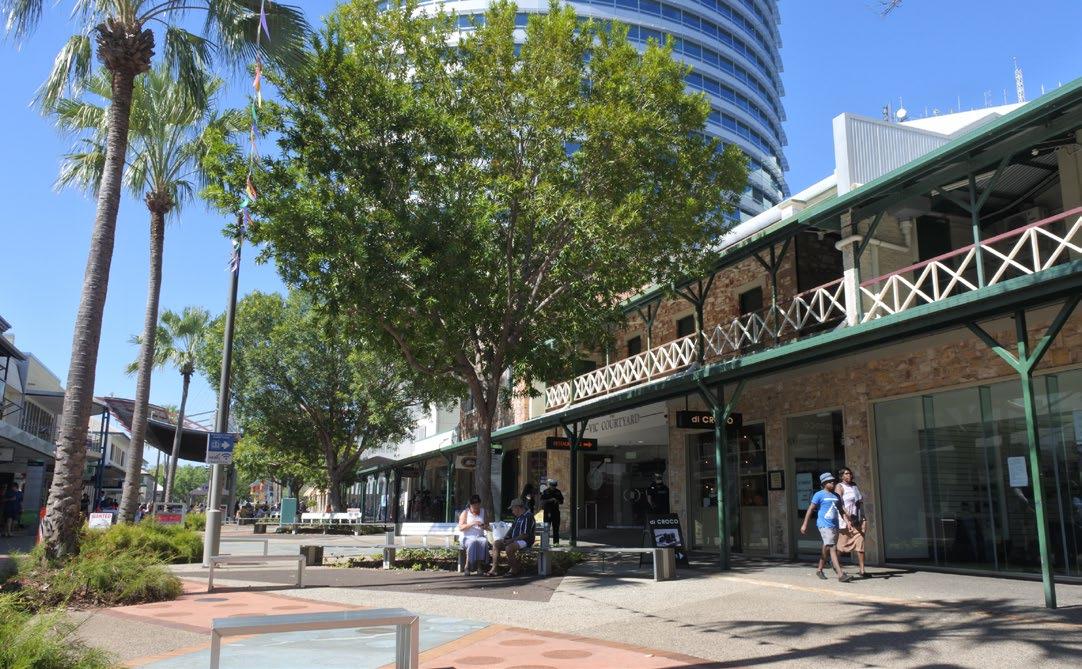
/ Police /
Darwin City Police Station
Mitchell Centre, Knuckley Street
131 444 or (08) 8901 0208
Casuarina Police Station (08) 8999 0800
28 Dripstone Road, Casuarina
Palmerston Police Station (08) 8947 7200
14 Cook Street, Farrar
HOSPITAL
Royal Darwin Hospital (08) 8922 8888
105 Rocklands Drive, Tiwi
Medical
Top End Medical Centre
2 / 11 Vanderline Drive, Casuarina (08) 8995 7900
Shop T28 / 1 Roystonea Ave, Palmerston (08) 7922 8000
Level 1 / 164 Forrest Pde, Rosebery (08) 8997 6500
1/44 Stuart Highway, Stuart Park (08) 8930 4900
Casuarina Square Dental Care
Shop 383A / 247 Trower Rd, Casuarina
(08) 8927 9418
Smith Street Dental (08) 8981 9149
111 Smith Street, Darwin
Pharmacy
United Chemists (08) 8927 7857
Shop 3, 11 Vanderlin Drive, Casuarina
Blooms The Chemist (08) 8981 2333
Shop 1&2, 37 Smith Street, Darwin City
Chemist Warehouse 48 Cavenagh Street, Darwin City (08) 8981 9202
Mitchell Centre, 55 Mitchell Street, Darwin (08) 8981 4442
TRANSPORT
Blue Taxi Company (08) 8980 3733
Darwin Radio Taxi
131 008
Darwin Bus (08) 8924 7666
Thrifty Car Hire
Top End Car Rentals (08) 8947 2846
Visitor Information
Visitor Information Centre
6 Bennett Street, Darwin City
